#pharaoh man is there for compositional reasons
Text
2023 Megaman Summer Fanart Contest - Rules Thread *CLOSED*
Happy Rockman Day! Time for the 12th annual-ish Megaman Summer Fanart Contest. Am I out of original ideas yet? Feels like it. But give it your all with these theme choices!
Two categories, in which you are allowed to submit one entry for each category, if you would like. If you place in one category, you will be automatically disqualified from the other, for reasons of fairness, and to give other people a chance to win a prize.
CATEGORY 1: The Sand-ly Cup Playoffs (Talent)


The very first summer contest I held was a Megaman sports videogame box art theme, in an ode to the summer Olympics and our only real Mega Man sports game at the time, Mega Man Soccer.
Taking a cue from Capcom’s recent announcement of it’s sponsorship/tie-in support of the Japan Volleyball Association, this year, let’s focus on beach sports.
What qualifies as a beach sport? Beach volleyball, soccer, polo, frisbee, and more, just to name a few. For a decent list of options, check this page out. Want to do something else more creative not mentioned here? You are welcome to.
As always, you are free to draw whatever characters you would like. However, for this theme, I would like you to draw some sort of sand-themed Mega Man character or characters involved in either the competition or ruining the gameplay of this beach sport. Who counts as a sand-themed character? Any major or minor character whose stage or design involves sand/desert works for me. Some examples could be: Pharaoh Man, Ground Man, Commando Man, Desertman.EXE, Anubis Necromancess, Terra Condor, Sand Snake, Pantheon Zombies, Mummira, etc.
Content Requirements:
* Megaman character(s) of your choice
* Characters playing some type of beach sport on a sand surface
* At least one sand-themed character(s), either in competition or ruining gameplay
* As the talent category, entries will be judged on things like detail and overall composition, on top of meeting basic content requirements
CATEGORY 2: BAELIAWATCH (Humor)

🎵 Some people consume all the Dark Chips
Afraid to side with Dr. Light
Some people need to help somebody
In a swimsuit team Cross Fusion fight
Don't you worry,
It's gonna be all right
'Cause I'm always ready
I won't let you outta my sight
(I'll be ready) I'll be ready
(Whenever you fear) No, don't you fear
(I'll be ready)
Forever and always, I'm always here🎵
Looks like we could use a lifeguard at this beach.
Huh? This isn’t the beach, this is a fanart contest rules thread!
It’s time to draw the heroes of the beach, those watching over the waters for dangers and saving people’s lives. The theme for this category is lifeguards. And one show that definitely mixed lifeguards and campy humor at times was Baywatch. Let’s draw a spiritual successor starring (The) Rockman as the leader of a ragtag group of beach lifeguards. Your goal for this category is to draw your favorite Megaman characters in some sort of humorous scene involving lifeguards wearing those iconic red swimsuits/trunks.
Illustrate slow-motion running with oily tans, rescuing Navis from Sharkman.EXE attacks, poorly written, long-form story comics about battling criminal activity while wearing a gratuitous, fan-servicey swimsuits the entire time, etc. Parody one of your favorite episodes, like that one time they held a funeral for a lifeguard on the beach, except this time it’s all the unlockable swimsuit characters holding a funeral for the XDive character who won’t ever get a skin because the game is dead. (Too soon? Yeah...)
Content Requirements:
* Megaman character(s) of your choice
* At least one character as a lifeguard, in red swimsuits/trunks in a parody of the Baywatch series
* As the humor category, entries will be judged on things like visual gags and how much they make us laugh, on top of meeting basic content requirements.
PRIZES:
The usual cash prizes, for you to use as you please.
The winners for each category will receive the following:
1st Place: $150 USD
2nd Place: $75 USD
3rd Place: $50 USD
SUBMISSION GUIDELINES:
When you submit, I would prefer you to include the following information in this format, along with your entry:
• (Your name/preferred alias) – As much as I usually know who you are, there’s always someone new or somebody who has a different preference from what their email name says.
• (Category this entry is for) – You can either say 1 or 2, Talent or Humor.
Only submit your own artwork, as usual. Any character, major or minor, from any series is allowed. OCs are allowed, as long as your art contains at least one canon Megaman character.
AI artwork is definitely not allowed. Unless the AI stands for “Akane Imagery,” which, in that case, submit as much as you want.
As always, participants are allowed to submit from all over the world.
Paypal is still the preferred method for cash prize payouts. Please have a valid account to receive your winnings.
Youngin’s, get your parents permission before entering.
Entries do not need to be colored, but it is preferred. The more effort put into things as always, the better chance you have!
Entries can either be e-mailed to me at rock2125[at]hotmail[dot]com, or you can just PM/note me a link to your pic.
DO NOT post your pics in this journal, your dA galleries, Twitter, tumblr blogs, other sites, etc. until the contest is over. This is the fairest way for competitive reasons. I prefer to keep them all secret until the deadline has passed.
I’ll edit a confirmed entry list in this thread when I receive them. So you won’t be in the dark about whether or not I’ve received your entry.
DEADLINE:
The deadline for this contest will be:
Monday, August 28th, 2023 by 11:59PM, global end of day.
This gives you close to 3 months to finish your entry!
MISCELLANEOUS INFO:
- As usual, If you don’t plan to enter, but would like to help me judge, please let me know through DM or mention so here. Never hurts to have extra opinions on all the entries.
Bug me with questions if you have any. Please join in, and good luck to everyone who enters!
Confirmed Entries:
Cat. 1 - Dr. Fresh, @ingopotato, Tori, Kaitlin.EXE, @pstart, Mattasaurs, Daidaro,
Cat. 2 - AbilityField, @grammars-doodles, miralie,
50 notes
·
View notes
Text
that ask going around about the Bible somehow "inventing" misogyny is driving me crazy, like does no one do their own research? ever? it's not that old!!
the earliest any credible scholar would date the composition of the old testament is to the 13th century BCE (maybe the 14th), towards the end of the Bronze Age and literal millennia after Mesopotamia and Egypt popped up.
Hammurabi lived in the 18th century BCE and his surviving laws codify female oppression in ways recognisable to a modern audience. Babylonian women even in the 19th century BCE were taught domestic skills instead of receiving the education of their male peers, were allocated domestic, reproductive, and/or sexual roles (aside from a few religious positions), excluded from politics, and routinely provably punished for disobeying male entitlement with physical violence.
By the time of the Qijia Culture in pre-dynastic China (23rd century BCE) a woman was buried alive along with the other grave good objects in a man's tomb.
despite Neithhotep holding some power as queen-consort (and possibly as pharaoh in her own right) in Egypt's First Dynasty (roughly 32nd-30th centuries BCE) and women having relatively more rights in some time periods of Egypt's long history, it was still definitively a patriarchal society in which women could not be state officials or administrators other than the exceptionally few women who became pharaohs over the course of more than 3000years of dynastic rule.
In ancient Mesopotamian Uruk society— 4000-3100 BCE! that's between 1,900 and 2,800 years before the earliest part of the Bible was written!— women are shown in art and the earliest snippets of written language in terms of their fertility service to men and excluded from even consideration in depiction of the worldly hierarchy (read "And They Said Let Us Make Gods in Our Image: Gendered Ideologies in Ancient Mesopotamia" by Pollock and Bernbeck for evidence from late Uruk)
I'm just giving passing examples, this isn't even 1% of the evidence for misogyny and ingrained patriarchy that predates the Bible!
so yes! the Bible codified sexism! duh! but invented it?? or even 'perfected' it?? do some fucking reading before talking out of your ass! if you’re a feminist, then the evidence is on your side! there’s no reason to say dumb shit!
like do you really think 2000 years into Bronze Age history when established civilisations were already as old as the Bible is now, someone woke up and thought 'hey what if women were inferior?' get your shit together! there's been a longer history of misogyny before the Bible than after simply by virtue of the fact that it isn't even that old in the scheme of things.
Misogyny isn't that young!!
#another angry history rant by me#i hope the rage comes across :)#to be clear: this isn't me being arbitrarily angry that ancient history isnt common knowledge#this is frustration from a student of ancient history who became a radfem specifically because i saw the pattern of sex-based oppression#it's like saying Titanic invented the trope of forbidden love because it has all the same themes#except it's more serious because this isnt a literary theme its an ongoing axis of oppression#believe it or not it fucking matters that misogyny developed earlier because it is *foundational* in the formation of these civilisations#*foundational* not *incidental*#my posts
2K notes
·
View notes
Text
S5 E31 Part 1: It is Actually Embarrassing How Long it Took Me To Realize This is Dark Magician
I’ve been telling my bro that I know too much about Yugioh now. I was like “am I really giving the experience of a first timer when it’s taken so long to write this that I clearly know way too much?” and then this episode happens where this guy who I thought was Marik is actually Dark Magician.
Like I watch this episode, then I do caps for this episode, and it wasn’t until I did a bunch of these caps that I realized...damn it, I’ve been calling this guy Marik for the past 3 episodes and guys.
He’s very much the dark Magician.
So it’s nice to know that I’m still just blissfully unaware of most Yugioh knowledge. Like I turned on the Master Duel game last week, opened a card, it was 5 paragraphs of information, and I was like “Yes. I still have no idea if this game is a long prank.”
And Bakura also felt like he was being pranked when he realized a Blue Eyes is not actually going to beat all 3 God Cards (which he already knew, because Bakura has already died to a God Card in S2 but wtv.)
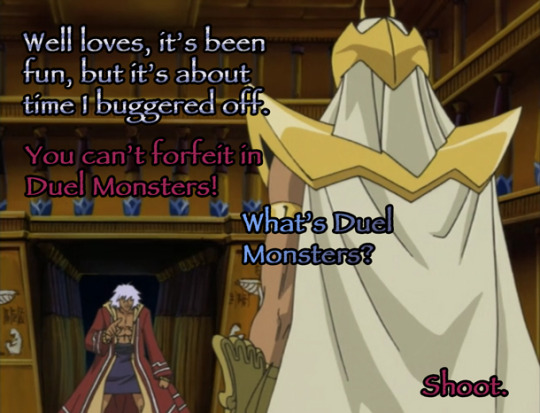
Bakura freakin loves just peacing out this season. Keeps announcing himself, throwing down some dead bodies, and then just walking away mid-duel. Like this is the third time he’s done this during this arc? But before he drops the mic he’s gonna leave some threats which like...remember that a majority of these people have never seen this asshole before.
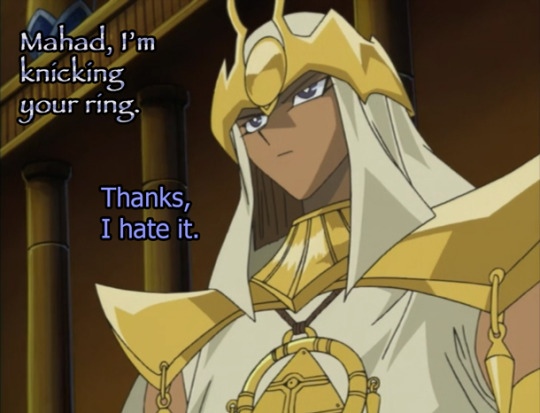
(OMG you can even see Mahads hair from this angle and I still thought he was a Marik for so freakin long OMG)
(read more under the cut)
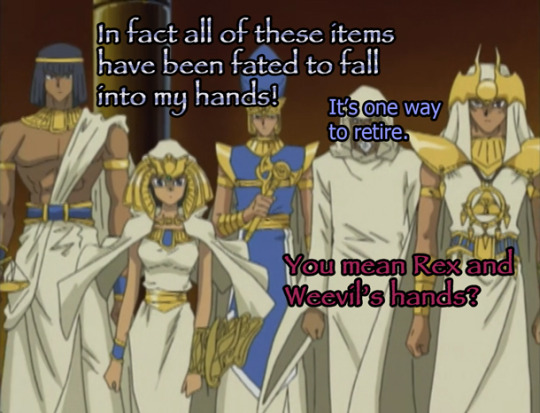
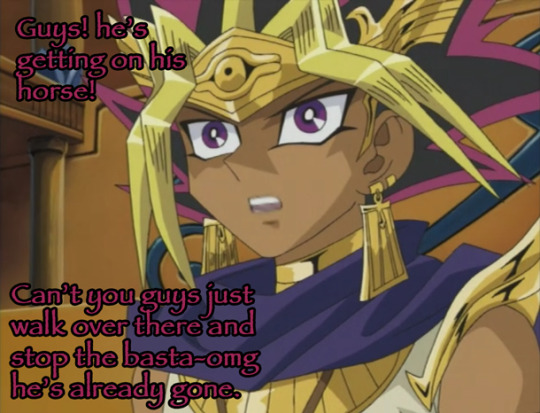
And off he goes on his glorious horse.

I love how much the Yugioh team likes to torture themselves by drawing horses, especially when they have the ability, they just do not have the budget to really get into that stuff. Like this shot here:

This shot the horse stayed mostly still and just kinda grew bigger and bigger until the bottom. It was very silly. I love horses in Yugioh.
Like it’s a shame that my recording/video situation for some reason started wigging out on me because in hindsight, I should make a supercut of every shot of a horse in Yugioh. It’s like...just a little uncanny valley, I very much enjoy the disaster horses.
So ends Pharaoh’s first evening as a Pharaoh.
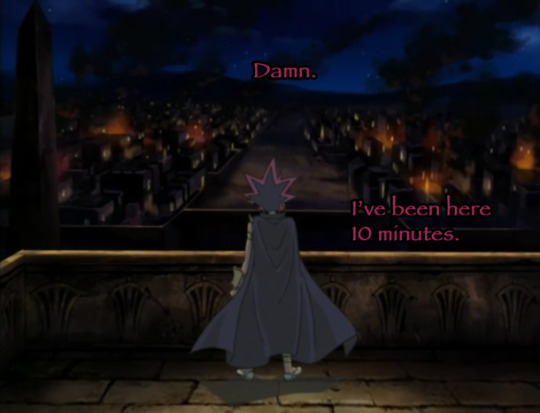
Which honestly, at least he’s still freakin alive. He’s doing pretty good for his track record. Eventually, Past Seto is going to stab him in the back, but let’s be honest, that’s also how Yugi will die in the future, making bets.
Anyway, remember how last episode I posited the question, how long will it take Pharaoh to notice the giant ass pyramid in the sky?
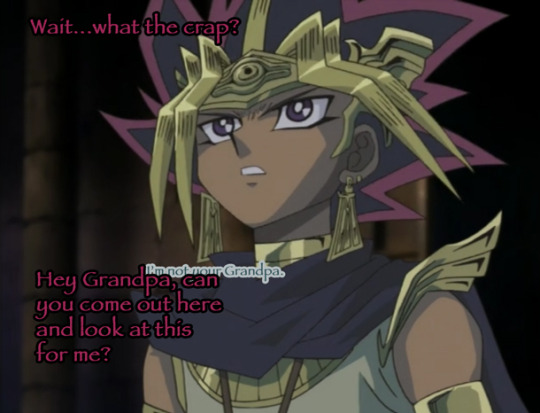
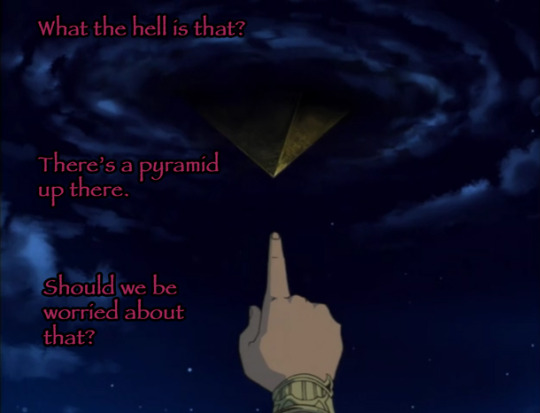
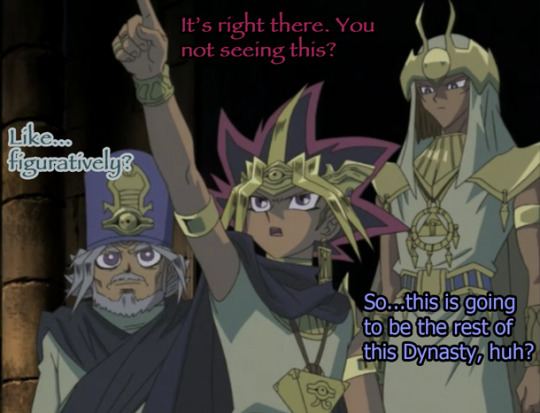
And he IMMEDIATELY has to tell everyone about it. Shimon was kinda like “you’ve had a rough day lets um...lets move you back to your bedroom and lock you inside.”
But this is normal for all Egyptian Pharaoh’s, right? Like from what I can tell from ancient history, putting the entire nation’s weight on a single human being’s shoulders makes them lose their nut. They’re probably just happy that Pharaoh isn’t burning all their houses down...instead it’s this other guy they’ve never seen before...houses get burnt down either way, but hey at least it wasn’t the Pharaoh this time who did it.
Except for Bakura’s village, that one got super burnt down by a Pharaoh.
OK maybe everyone’s houses are crispy toast no matter who’s in charge.
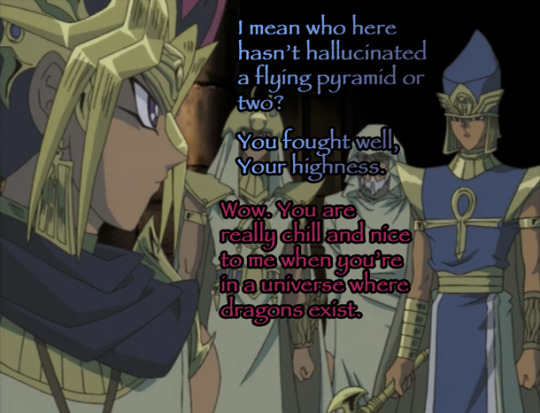
Pharaoh thinks longingly “man....if only Kaiba could see us working together and getting along...hmmm” like a Parent would think about their own unruly children.
But, speaking of individual’s who fold under the pressure of carrying the entire future of mankind on their shoulders, Seto has already lost his mind. Like full melt down. Usually it takes a couple more episodes than this in an arc for Seto to go spare, but the millennium eye took his already fragile composition and turned it into a fine powder (yes it is still sitting on his desk).
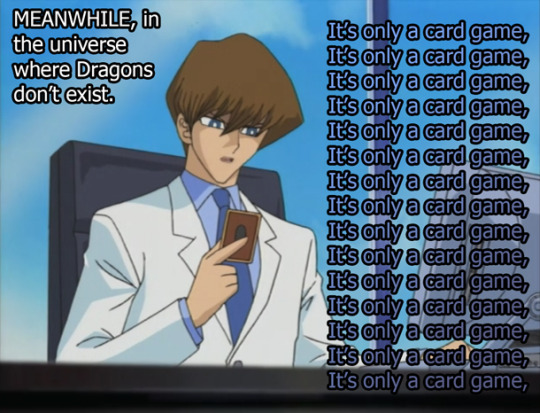
So he does what normal people do and starts having a conversation with it.
Normal thing to do.


And then Seto decided to do the one thing you should never, not ever do with this horrible eyeball.

...he has learned nothing from seeing Pegasus with this thing lodged into his left eye all these years. It has never occured to Seto that the eye WANTS to sit in there.
And, if you remember, the guy standing behind past Seto was Aknadin, who is in the past wearing the eye.
Yo, how gross is it to think about how this is a used false eyeball. Seto’s hands are touching something that touched the backside of a dude 5000 years ago holy crap the cooties on that thing.
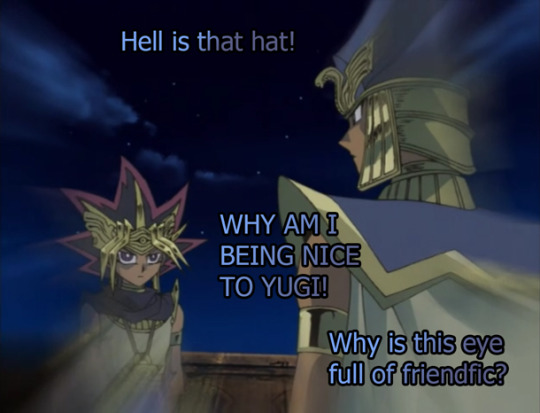

Seto was likely this close to becoming the next Pegasus.
Man that would have been a hella entertaining arc if Seto got millennium item cursed. That or we would see absolutely no difference since Seto is already such a disaster. It would put Pegasus out of a job though.
...but would it? I feel like Kaiba doesn’t have the patience to oil paint.

Bye, Seto. Off to join the plot. No idea how he’s going to find the tomb, but he’s probably got a tracker embedded into the neck of every single person that’s been in his competitions.
Back in the past, we start to see how Seto might eventually want to do a tiny bit of assassination.
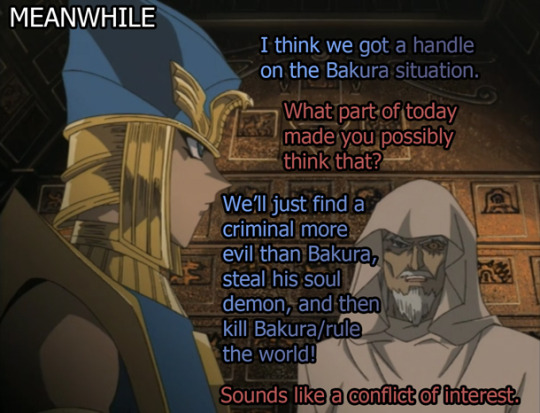
By the way, Bro and I were squinting at Aknadin here, and realized he could be a past version of Marik’s Dad, rather than a Pegasus. Just a thought. Or maybe it’s because all old guys with beards look the same in anime.
Talking to himself, Aknadin lets us, the audience know, that it’s finally time to make the Death Count Higher.

How many people lived in a village in the ancient past...like 1000 people? That sound right? Everything I know about small towns I learned from my roomate’s friend in college who came from a small town in Nevada, so this is what I’m basing this off of. Until I get a number, Bakura comes from Caliente, Nevada (they pronounce it “ca-lien-ee”).
Now Aknadin said this in his bean, but even if he said it outloud, Seto’s got these metallic ear covers so he probably couldn’t hear him anyway. This information lets us know that the reason why Bakura’s got such an angy ghost is because he’s the end result of a whole lot of dead people.
And so Aknadin’s like “I think Bakura is ALREADY the worst ghost you’ll meet Seto. Don’t ask me how I know that.”
But Seto isn’t listening because he just loves stuffing people’s souls into tablets. I think one of you mentioned that the dub changes the tablet magic a little bit, and that the original version of this show made it a LOT more like murder. So youknow...changes why Seto is getting so into making tablets if it’s actually him getting bloodlust.
So basically every version of Seto is secretly fueling the war machine that he insists he’s trying to end.
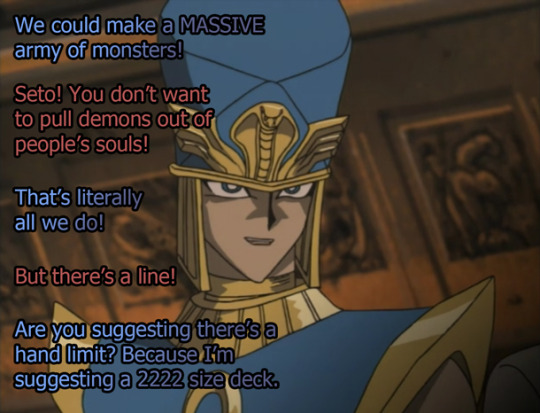
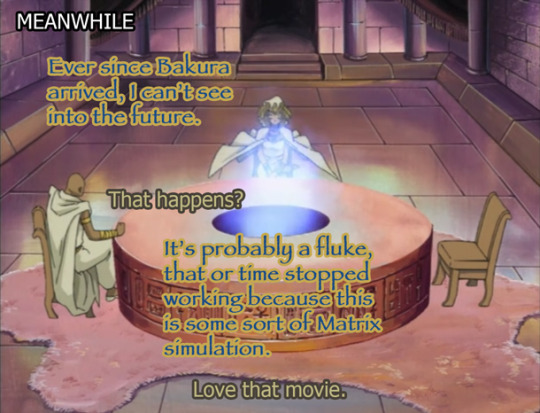
Not gonna lie, I kind of love this weird pink fur rug.
Like damn. Maybe it’s because I’m a millennial and we’re waaay too much into decorating our house with puce and gold but like...look at it. The color combo in this room is a joy.
Anyway, time doesn’t work anymore, which makes Isis’ job freakin suck. Pharaoh could let her know that “yeah so I was 5000 years into the future until 10 minutes ago” but he just doesn’t want to tell anyone that because they already think he’s fruit loops and his grip on the throne is a little tenuous atm.

*what?*
He kept...what?
how did he do that?
Kept this necklace, so maybe there’s a chance Pharaoh also kept his modern underwear?
And again, the YugixTea ship writing tender moments so much better when the characters are separated than when they actually get to be together. These writers man, it’s their favorite way to write romance, because this is also how they write every other ship we’ve seen on the show. Except for whatever the hell is going on between Rex and Weevil, who will probably be buried in the same damn coffin.

Back in Yugi’s head, they’re just kind of lost and wandering around, which is to be expected.
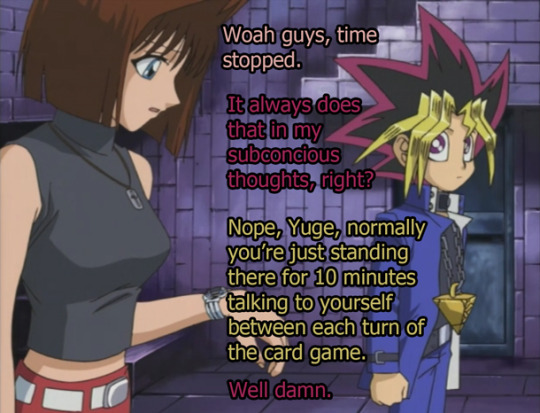
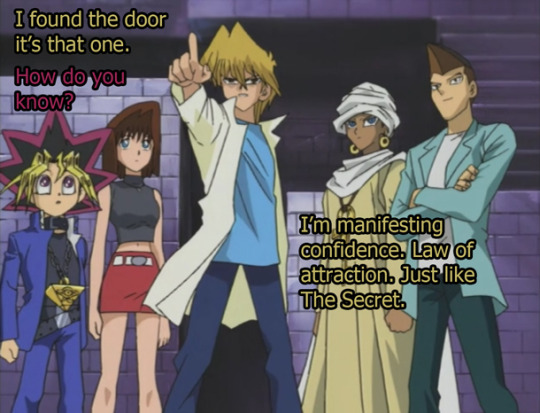

Yugi has sent so many people off a ledge, that he does it subconsciously.

This did not work. They will be here for the rest of this episode.
Anyway, see you all next update, and until then, here’s that handy link to read these all in chrono order from S1 Ep1.
https://steve0discusses.tumblr.com/tagged/yugioh/chrono
#YGO#Yugioh#Yu-Gi-Oh#Episode recaps#Photo recaps#S5#Ep31#Yami#Pharaoh#Yugi Muto#Tea Gardner#Tristan Taylor#Joey Wheeler#Seto Kaiba#Thief King Bakura#Bakura#Seto Kaiba screaming at a false eyeball on kid's TV#Yami Wigging Out at the giant pyramid in the sky no one else can see
42 notes
·
View notes
Photo

The Ancient Egyptian Roots of Christianity by Moustafa Gadalla
“This book reveals the Ancient Egyptian roots of Christianity, both historically and spiritually. This Expanded Version of the book consists of three parts to coincide with the terms of trinity. The first part demonstrates that the major biblical ancestors of the biblical Jesus are all Ancient Egyptian prominent characters. The second part demonstrates that the accounts of the “historical Jesus” are based entirely on the life and death of the Egyptian Pharaoh, Twt/Tut-Ankh-Amen. The third part demonstrates that the “Jesus of Faith” and the Christian tenets are all Egyptian in origin—such as the essence of the teachings/message, the creation of the universe and man (according to the Book of Genesis), as well as the religious holidays.The very thing that is now called the Christian religion was already in existence in Ancient Egypt, long before the adoption of the New Testament. The British Egyptologist, Sir E. A. Wallis Budge, wrote in his book, The Gods of the Egyptians [1969],The new religion (Christianity) which was preached there by St. Mark and his immediate followers, in all essentials so closely resembled that which was the outcome of the worship of Osiris, Isis, and Horus.The similarities, noted by Budge and everyone who has compared the Egyptian Osiris/Isis/ Horus allegory to the Gospel story, are striking. Both accounts are practically the same, e.g. the supernatural conception, the divine birth, the struggles against the enemy in the wilderness, and the resurrection from the dead to eternal life. The main difference between the “two versions”, is that the Gospel tale is considered historical and the Osiris/Isis/Horus cycle is an allegory. The spiritual message of the Ancient Egyptian Osiris/Isis/Horus allegory and the Christian revelation is exactly the same.The British scholar A.N. Wilson pointed out in his book, Jesus:The Jesus of History and the Christ of Faith are two separate beings, with very different stories. It is difficult enough to reconstruct the first, and in the attempt we are likely to do irreparable harm to the second.This book will demonstrate that the “Jesus of History”, the ”Jesus of Faith”, and the tenets of Christianity are all Ancient Egyptian. This will be done without causing any “irreparable harm” as per A.N. Wilson’s concern, for two main reasons: Firstly, the truth must be told. Secondly, explaining Christian tenets via their original Ancient Egyptian contexts will enhance the idealism of Christianity.This Expanded Version of the book consists of three parts to coincide with the terms of trinity—the Three that are Two that are One.The first part demonstrates that the major biblical ancestors of the biblical Jesus are all Ancient Egyptian prominent individuals.The second part demonstrates that the accounts of the “historical Jesus” are based entirely on the life and death of the Egyptian Pharaoh, Twt/Tut- Ankh-Amen.The third part demonstrates that the “Jesus of Faith” and the Christian tenets are all Egyptian in origin—such as the essence of the teachings/message, the creation of the universe and man (according to the Book of Genesis), as well as the religious holidays.There is an undeniable irony and a profound, deep, undeniable truth in Hosea’s prophetic saying, Out of Egypt have I called my Son. A deep irony indeed.Let us open our minds and review the available evidence. For the truth is a composite of different and complementary pieces of a puzzle. Let us put the pieces in the right location, time and order.”
#Egyptian mysticism#early christianity#Jesus Christ#Blood and Body of Osiris#Osiris#occultus#fav#books
6 notes
·
View notes
Text
Famous historical figures
A list of famous people throughout history. These famous historical figures are chosen from a range of different cultures and countries. They include famous spiritual figures, politicians and writers who have helped to shape human history.
BCE
Sri Ramachandra (c. 5114 BCE) Rama was a model king of Ayodhya who lived according to the dharma. He went to Sri Lanka to fight Ravana who had captured his wife, Sita. Rama is considered an incarnation of Vishnu in Hindu mythology.
Sri Krishna (c. BCE) – Spiritual Teacher of Hinduism. Sri Krishna gave many discourses to his disciple Arjuna on the battlefield of Kurukshetra. These discourses were written down in the Bhagavad Gita.
Ramses II (1303 BCE – 1213 BCE) – Ramses or Ramesses was the third Egyptian Pharaoh, ruling between 1279 BC – 1213 BC. Ramses the Great consolidated Egyptian power, through military conquest and extensive building.
Homer (8th Century BC) Homer is the author of the Iliad and the Odyssey. Two classics of Greek literature. His writings form a significant influence on Western literature.
Cyrus the Great (600 – 530 BC) was the founder of the Persian (Achaemenid) Empire. Cyrus conquered the empires of Media, Lydia and Babylonia, creating the first multi-ethnic state which at its peak accounted for around 40% of the global population.
Lord Buddha (c 563 – 483 BC) Spiritual Teacher and founder of Buddhism. Siddhartha was born a prince in northern India. He gave up the comforts of the palace to seek enlightenment. After attaining Nirvana, he spent the remainder of his years teaching.
Confucius (551 – 479 BC) – Chinese politician, statesman, teacher and philosopher. His writings on justice, life and society became the prevailing teachings of the Chinese state and developed into Confucianism.
Socrates (469 BC–399 BC) – Greek philosopher. Socrates developed the ‘Socratic’ method of self-enquiry. He had a significant influence on his disciples, such as Plato and contributed to the development of Western philosophy and political thought.
Plato (424 – 348 BC) – Greek philosopher. A student of Socrates, Plato founded the Academy in Athens – one of the earliest seats of learning. His writings, such as ‘The Republic’ form a basis of early Western philosophy. He also wrote on religion, politics and mathematics.
Aristotle (384 BC – 322 BC) – Greek philosopher and teacher of Alexander the Great. Aristotle was a student of Plato, but he branched out into empirical research into the physical sciences. His philosophy of metaphysics had an important influence on Western thought.
Alexander the Great (356 – 323 BC) – King of Macedonia. He established an Empire stretching from Greece to the Himalayas. He was a supreme military commander and helped diffuse Greek culture throughout Asia and northern Africa.
Archimedes (287 B.C – 212) Mathematician, scientist and inventor. Archimedes made many contributions to mathematics. He explained many scientific principles, such as levers and invented several contraptions, such as the Archimedes screw.
Ashoka (c 269 BCE to 232 BCE) – One of the greatest Indian rulers. Ashoka the Great ruled from 269 BC to 232 BC he embraced Buddhism after a bloody battle and became known for his philanthropism, and adherence to the principles of non-violence, love, truth and tolerance.
Julius Caesar (100 – 44 BC) As military commander, Caesar conquered Gaul and England extending the Roman Empire to its furthest limits. Used his military strength to become Emperor (dictator) of Rome from 49 BC, until his assassination in 44BC.
Augustus Caesar (63 BC-AD 14) – First Emperor of Rome. Caesar (born Octavian) was one the most influential leaders in world history, setting the tone for the Roman Empire and left a profound legacy on Western civilisation.
Cleopatra (69 -30 BC) The last Ptolemaic ruler of Egypt. Cleopatra sought to defend Egypt from the expanding Roman Empire. In doing so, she formed relationships with two of Rome’s most powerful leaders Marc Anthony and Julius Caesar.
AD
Jesus of Nazareth (c.5BC – 30AD), Jesus of Nazareth, was a spiritual teacher, and the central figure of Christianity. By Christians, he is considered to be the Messiah predicted in the Old Testament.
St Paul (5 – AD 67) – Christian missionary. St Paul was Jewish and a Roman citizen who converted to Christianity. His writings and teachings did much to define and help the spread of Christianity.
Marcus Aurelius (121 – 180) – Roman Emperor and philosopher. He is considered the last of the five good Emperors. His Meditations are a classic account of Stoic philosophy.
Emperor Constantine (272 – 337) First Roman Emperor to embrace Christianity. He called the First Council of Nicaea in 325 which clarified the Nicene Creed of Christianity.
Muhammad (570 – 632) Prophet of Islam. Muhammad received revelations which form the verses of the Qur’an. His new religion unified Arabia under the new Muslim religion.
Attila the Hun (5th Century) Ruler of the Huns who swept across Europe in the Fifth Century. He attacked provinces within the Roman Empire and was Rome’s most feared opponent.
Charlemagne (742 – 814) – King of Franks and Emperor of the Romans. Charlemagne unified Western Europe for the first time since the fall of the Roman Empire. He provided protection for the Pope in Rome.
Genghis Kahn (1162 – 1227) – Leader of the Mongol Empire stretching from China to Europe. Genghis Khan was a fierce nomadic warrior who united the Mongol tribes before conquering Asia and Europe.
Eleanor of Aquitaine (1122-1204) – The first Queen of France. Eleanor influenced the politics of western Europe through her alliances and her sons Richard and John – who became Kings of England.
Saladin (1138 – 1193) – Leader of the Arabs during the Crusades. He unified Muslim provinces and provided effective military opposition to the Christian crusades.
Thomas Aquinas (1225 – 1274) Influential Roman Catholic priest, philosopher and theologian.
Marco Polo (1254 – 1324) Venetian traveller and explorer who made ground-breaking journeys to Asia and China, helping to open up the Far East to Europe.
Johann Gutenberg (1395 – 1468) – German inventor of the printing press. Gutenberg’s invention of movable type started a printing revolution which was influential in the Reformation.
Joan of Arc – (1412-1431) – French saint. Jean d’Arc was a young peasant girl who inspired the Dauphin of France to renew the fight against the English. She led French forces into battle.
Christopher Columbus (1451 – 1506) – Italian explorer who landed in America. He wasn’t the first to land in America, but his voyages were influential in opening up the new continent to Europe.
Leonardo da Vinci ( 1452 – 1519) – Italian scientist, artist, and polymath. Da Vinci painted the Mona Lisa and the Last Supper. His scientific investigations covered all branches of human knowledge.
Guru Nanak (1469 1539) Indian spiritual teacher who founded the Sikh religion. Guru Nanak was the first of the 10 Sikh Gurus. He travelled widely disseminating a spiritual teaching of God in everyone.
Martin Luther (1483 – 1546) – A key figure in the Protestant Reformation. Martin Luther opposed papal indulgences and the power of the Pope, sparking off the Protestant Reformation.
Babur (1483 – 1531) – Founder of the Moghul Empire on the Indian subcontinent. A descendant of Genghis Khan, he brought a Persian influence to India.
William Tyndale (1494 – 1536) – A key figure in the Protestant Reformation. Tyndale translated the Bible into English. It’s wide dissemination changed English society. He was executed for heresy.
Akbar (1542 – 1605) – Moghul Emperor who consolidated and expanded the Moghul Empire. Akbar also was a supporter of the arts, culture and noted for his religious tolerance.
Sir Walter Raleigh (1552 – 1618) – English explorer who made several journeys to the Americas, including a search for the lost ‘Eldorado.’
Galileo Galilei (1564 -1642) – Astronomer and physicist. Galileo developed the modern telescope and, challenging the teachings of the church, helped to prove the earth revolved around the sun.
William Shakespeare (1564- 1616) English poet and playwright. Shakespeare’s plays, such as Hamlet, Macbeth and Othello have strongly influenced English literature and Western civilisation.
Rene Descartes (1596 – 1650) Dubbed the father of modern philosophy, Descartes was influential in a new rationalist movement, which sought to question basic presumptions with reason.
Oliver Cromwell (1599 – 1658) – British Parliamentarian. Cromwell led his new model army in defeating King Charles I and creating a new model of government.
Voltaire (1694 – 1778) – French philosopher. Voltaire’s biting satire helped to create dissent in the lead up to the French revolution.
Sir Isaac Newton (1642-1727) – English mathematician and scientist. Newton laid the foundations of modern physics, with his laws of motion and gravity. He made extensive scientific investigations.
Eighteenth Century
Catherine the Great (1729 – 1796) – Russian Queen during the Eighteenth Century. During her reign, Russia was revitalised becoming a major European power. She also began reforms to help the poor.
George Washington (1732 – 1799) – 1st President of US. George Washington led the American forces of independence and became the first elected President.
Tom Paine (1737- 1809) English-American author and philosopher. Paine wrote‘Common Sense‘ (1776) and the Rights of Man (1791), which supported principles of the American and French revolutions.
Thomas Jefferson (1743- 1826) 3rd President of US. Author of the Declaration of Independence. Jefferson passed laws on religious tolerance in his state of Virginia and founded the University of Virginia.
Mozart (1756 – 1791) – Austrian Music composer. Mozart’s compositions ranged from waltzes to Requiem. He is widely regarded as one of the greatest musical geniuses of all time.
Nineteenth Century
William Wilberforce (1759 – 1833) – British MP and campaigner against slavery. Wilberforce was a key figure in influencing British public opinion and helping to abolish slavery in 1833.
Napoleon Bonaparte (1769 – 1821) – French military and political leader. Napoleon made France a major European power and meant his Napoleonic code was widely disseminated across Europe.
Simon Bolivar (1783 – 1830) – Liberator of Latin American countries. Bolivar was responsible for the liberation of Peru, Bolivia, Venezuela and Colombia.
Abraham Lincoln (1809 – 1865) 16th President of US. Lincoln led the northern Union forces during the civil war to protect the Union of the US. During the civil war, Lincoln also promised to end slavery.
Charles Darwin (1809 – 1882) – Developed theory of evolution. His book ‘The Origin of Species’ (1859) laid the framework for evolutionary biology and changed many people’s view of life on the planet.
Karl Marx (1818 – 1883) Principle Marxist philosopher. Author of Das Kapitaland The Communist Manifesto. (with F.Engels) Marx believed that Capitalist society would be overthrown by Communist revolution.
Queen Victoria (1819 – 1901) – Queen of Great Britain during the Nineteenth Century. She oversaw the industrial revolution and the growth of the British Empire.
Louis Pasteur (1822 – 1895) – French chemist and Biologist. Pasteur developed many vaccines, such as for rabies and anthrax. He also developed the process of pasteurisation, making milk safer.
Leo Tolstoy (1828 – 1910) – Russian writer and philosopher. Tolstoy wrote the epic ‘War and Peace’ Tolstoy was also a social activist – advocating non-violence and greater equality in society.
Thomas Edison (1847 – 1931) – Inventor and businessman. Edison developed the electric light bulb and formed a company to make electricity available to ordinary homes.
Twentieth Century
Oscar Wilde (1854 – 1900) – Irish writer. Wilde’s plays included biting social satire. He was noted for his wit and charm. However, after a sensational trial, he was sent to jail for homosexuality.
Woodrow Wilson (1856 – 1924) – President of US during WWI. Towards the end of the war, Wilson developed his 14 points for a fair peace, which included forming a League of Nations.
Mahatma Gandhi (1869 – 1948) – Indian nationalist and politician. Gandhi believed in non-violent resistance to British rule. He sought to help the ‘untouchable’ caste and also reconcile Hindu and Muslims.
V. Lenin (1870-1924) – Born in Ulyanovsk, Russia. Lenin was the leader of Bolsheviks during the Russian Revolution in 1917. Lenin became the first leader of the Soviet Union influencing the direction of the new Communist state.
The Wright Brothers (Orville, 1871 1948) – developed the first powered aircraft. In 1901, they made the first successful powered air flight, ushering in a new era of air flight.
Winston Churchill (1874 – 1965) Prime Minister of Great Britain during the Second World War. Churchill played a key role in strengthening British resolve in the dark days of 1940.
Konrad Adenauer (1876-1967) – West German Chancellor post world war II. Adenauer had been an anti-nazi before the war. He played a key role in reintegrating West Germany into world affairs.
Albert Einstein (1879 – 1955) – German / American physicist. Einstein made groundbreaking discoveries in the field of relativity. Einstein was also a noted humanitarian and peace activist.
Ataturk (1881-1938) – founder of the Turkish Republic. From the ruins of the Ottoman Empire, Ataturk forged a modern secular Turkish republic.
A Little History of the World
A Little History of the World: Illustrated Edition at Amazon – by E. H. Gombrich
John M Keynes (1883 – 1946) Influential economist. Keynes developed a new field of macroeconomics in response to the great depression of the 1930s.
Franklin D. Roosevelt (1882 – 1945) US President (1932-1945) Roosevelt led the US through its most turbulent time of the great depression and World War II.
Adolf Hitler (1889 – 1945) Dictator of Nazi Germany. Hitler sought to conquer Europe and Russia, starting World War Two. Also responsible for the Holocaust, in which Jews and other ‘non-Aryans’ were killed.
Jawaharlal Nehru (1889-1964) – First Indian Prime Minister. Nehru came to power in 1947 and ruled until his death in 1964. He forged a modern democratic India, not aligned to either US or the Soviet Union.
Dwight Eisenhower (1890 – 1969) – Supreme Allied Commander during the Normandy landings of World War II. Eisenhower also became President from 1953-1961.
Charles de Gaulle (1890- 1970) French politician. De Gaulle became leader of the ‘Free French’ after the fall of France in 1940. Became President after the war, writing the constitution of the 5th Republic.
Chairman Mao (1893 – 1976) Mao led the Chinese Communist party to power during the long march and fight against the nationalists. Mao ruled through the ‘cultural revolution’ until his death in 1976.
Mother Teresa (1910-1997) – Catholic nun from Albania who went to India to serve the poor. Became a symbol of charity and humanitarian sacrifice. Awarded the Nobel Peace Prize.
John F. Kennedy (1917 – 1963) – US President 1961-1963. J. F.Kennedy helped to avert nuclear war during the Cuban missile crisis. He also began to support the civil rights movement before his assassination in Dallas, November 1963.
Nelson Mandela (1918 – ) The first President of democratic South Africa in 1994. Mandela was imprisoned by the apartheid regime for 27 years, but on his release helped to heal the wounds of apartheid through forgiveness and reconciliation.
Pope John Paul II (1920 – 2005) – Polish Pope from 1978-2005. Pope John Paul is credited with bringing together different religions and playing a role at the end of Communism in Eastern Europe.
Queen Elizabeth II (1926 – ) British Queen from 1952. The second longest serving monarch in history, Elizabeth saw six decades of social and political change.
Martin Luther King (1929 – 1968) Martin Luther King was a powerful leader of the non-violent civil rights movement. His 1963 speech ‘I have a dream’ being a pinnacle moment.
14th Dalai Lama (1938 – ) Spiritual and political leader of Tibetans. The Dalai Lama was forced into exile by the invading Chinese. He is a leading figure for non-violence and spirituality.
Mikhail Gorbachev (1931 – ) Leader of the Soviet Union. Oversaw transition from Communism in Eastern Europe to democracy. Awarded the Nobel Peace Prize in 1990.
Muhammad Ali (1942- ) American boxer. Muhammad Ali had his boxing license removed for refusal to fight in Vietnam. He became a leading figure in the civil rights movement.
Citation: Pettinger, Tejvan. “Famous historical people”, Oxford, UK. www.biographyonline.net, 18/12/2013. Published 1 March 2018. Last updated 7 July 2019
3 notes
·
View notes
Photo

The Cost of Discipleship: Readings for the 23rd Sunday in Ordinary Time
One of the most famous German opponents of Adolf Hitler and Nazism was the Lutheran pastor and theologian Dietrich Bonhoeffer, whom the Nazis executed by hanging in April 1945 for his involvement in a plot against Hitler himself. Bonhoeffer’s most famous work was a meditation on the Sermon on the Mount entitled (in English) The Cost of Discipleship. In it, Bonhoeffer parted ways with a Protestantism that understood “salvation by faith alone” as some kind of easy road to heaven. Bonhoeffer criticized “easy-believism” as “cheap grace”
Cheap grace is the preaching of forgiveness without requiring repentance, baptism without church discipline, communion without confession. Cheap grace is grace without discipleship, grace without the cross, grace without Jesus Christ.
Costly grace confronts us as a gracious call to follow Jesus, it comes as a word of forgiveness to the broken spirit and the contrite heart. It is costly because it compels a man to submit to the yoke of Christ and follow him; it is grace because Jesus says: "My yoke is easy and my burden is light.
Bonhoeffer was a Protestant, but there is much in his writings that a Catholic can affirm, including the passage above. I can’t help thinking of Bonhoeffer as I meditate on the Readings for this coming Sunday, which stress the high cost of discipleship to this mysterious man Jesus of Nazareth, who is nothing other than the Wisdom of God in the flesh.
1. Our First Reading is Wis 9:13-18b:
Who can know God’s counsel, or who can conceive what the LORD intends? For the deliberations of mortals are timid, and unsure are our plans. For the corruptible body burdens the soul and the earthen shelter weighs down the mind that has many concerns. And scarce do we guess the things on earth, and what is within our grasp we find with difficulty;
but when things are in heaven, who can search them out? Or who ever knew your counsel, except you had given wisdom and sent your holy spirit from on high? And thus were the paths of those on earth made straight.
There is little controversy over the date and authorship of the Wisdom of Solomon. Strictly speaking, the book makes no claims about its own authorship, although the first-person “voice” of the book clearly cloaks itself in the persona of the biblical Solomon. The Church Fathers recognized this as a literary device. St. Augustine’s remark is representative:
Next are the … three books of Solomon, viz., Proverbs, Song of Songs, and Ecclesiastes. For two books, one called Wisdom and the other Ecclesiasticus, are ascribed to Solomon from a certain resemblance of style, but the most likely opinion is that they were written by Jesus the son of Sirach. Still they are to be reckoned among the prophetical books, since they have attained recognition as being authoritative.
The Wisdom of Solomon is heavily influenced by Greek philosophy and rhetoric. It gives every evidence of having been composed originally in Greek, and a variety of factors, including the dominating concern with matters Egyptian in the second half of the book, suggest that the large Jewish community in Alexandria, Egypt, was the location of composition, at some time between 250 and 100 BC. Since the author seems to be responding to a campaign of persecution against observant Jews, scholars often propose either the reign of Ptolemy IV Philopator (221-204 B.C.), or Ptolemy VII Physicon (145-117 B.C.) as likely periods of composition.
A major contribution of the Book of Wisdom is to the theology of the Holy Spirit. The book characterizes divine wisdom as a person and virtually identifies her with the spirit of God, i.e. the Holy Spirit:
For wisdom is a kindly spirit (1:6)
In her there is a spirit that is intelligent, holy, unique … all-powerful, all-seeing (7:22)
She is a breath of the power of God, and pure emanation of the glory of the Almighty (7:25)
Who has learned your counsel, unless you have given Wisdom, and sent your Holy Spirit from on high? (9:17)
So there is progress in revelation in the Book of Wisdom. In this late Old Testament work, we see further articulated a reality hinted at previously, namely, that there are multiple persons in the Godhead, and God’s Spirit is a Person.
In Patristic exegesis, these passages about Wisdom are often taken as describing Christ, whom the New Testament identifies as “the wisdom of God” (1 Cor 1:24). Although the more natural application of these passages of Wisdom is directly to the Third Person, the Holy Spirit, their application to the Second Person is justified inasmuch as he is the Christ, the “Anointed One,” who is anointed with the Spirit and thus shares the Spirit’s attributes.
Focusing on this Sunday’s Reading, we note that the sacred author stresses how difficult the attainment of wisdom is, even in relation to material concerns, much less to supernatural and transcendent truth. Our physical needs and appetites confuse and cloud our thinking, because we are strongly motivated to reason to conclusions that allow us to satisfy our bodies, rather than to conclusions that are strictly true. In humility, the sage acknowledges that the attainment of truth about ultimate reality is really a superhuman effort. It is something beyond our strength, truly a miracle. Without the help of God, we would all but despair of coming to the truth about the reality of things. But God makes it possible by the gift of the Holy Spirit:
Or who ever knew your counsel, except you had given wisdom and sent your holy spirit from on high?
The sage here reflects a biblical theme that wisdom is the gift of God’s Spirit. This can be seen in the accounts of notable wise men in salvation history.
For example, Joseph, the visionary and royal steward over the land of Egypt, derived his wisdom from the Holy Spirit:
Gen. 41:38
And Pharaoh said to his servants, “Can we find such a man as this, in whom is the Spirit of God?” 39 So Pharaoh said to Joseph, “Since God has shown you all this, there is none so discreet and wise as you are …
Likewise Daniel:
Dan. 5:11
There is in your kingdom a man in whom is the spirit of the holy gods. In the days of your father light and understanding and wisdom, like the wisdom of the gods, were found in him …
And the Messiah who is to come will be marked by similar wisdom:
Is. 11:2
And the Spirit of the LORD shall rest upon him, the spirit of wisdom and understanding, the spirit of counsel and might, the spirit of knowledge and the fear of the LORD.
2. Our Responsorial Psalm is Ps 90:3-4, 5-6, 12-13, 14-17
R. (1) In every age, O Lord, you have been our refuge.
You turn man back to dust,
saying, “Return, O children of men.”
For a thousand years in your sight
are as yesterday, now that it is past,
or as a watch of the night.
R. In every age, O Lord, you have been our refuge.
You make an end of them in their sleep;
the next morning they are like the changing grass,
Which at dawn springs up anew,
but by evening wilts and fades.
R. In every age, O Lord, you have been our refuge.
Teach us to number our days aright,
that we may gain wisdom of heart.
Return, O LORD! How long?
Have pity on your servants!
R. In every age, O Lord, you have been our refuge.
Fill us at daybreak with your kindness,
that we may shout for joy and gladness all our days.
And may the gracious care of the LORD our God be ours;
prosper the work of our hands for us!
Prosper the work of our hands!
R. In every age, O Lord, you have been our refuge.
Psalm 90 is the only Psalm attributed to Moses, and the it has a decided melancholy tone, as a meditation on human frailty immediately after the disastrous ending of Psalm 89, in which all the hopes of Israel pinned upon the Davidic dynasty are dashed in tragedy and destruction. The Israelite reader of the psalms, having been brought to despair over the apparent failure of the covenant with David, now “goes back to Moses” for advice in Psalm 90. Moses observes the utter lack of power on the part of human beings, and recognizes that the only lasting things are those granted by God. He leads Israel in prayer: “Teach us to number our days aright, that we may gain wisdom of heart!” Much like the sacred author of the Book of Wisdom, Moses acknowledges that wisdom is beyond our reach, and is ultimately a gift from God.
3. Our Second Reading is Phmn 9-10, 12-17
I, Paul, an old man, and now also a prisoner for Christ Jesus, urge you on behalf of my child Onesimus, whose father I have become in my imprisonment; I am sending him, that is, my own heart, back to you. I should have liked to retain him for myself, so that he might serve me on your behalf in my imprisonment for the gospel, but I did not want to do anything without your consent, so that the good you do might not be forced but voluntary.
Perhaps this is why he was away from you for a while, that you might have him back forever, no longer as a slave but more than a slave, a brother, beloved especially to me, but even more so to you, as a man and in the Lord. So if you regard me as a partner, welcome him as you would me.
From now to the end of the liturgical year, the Lectionary reads semi-continuously through St. Paul’s letters to individuals (Philemon, Timothy, Titus), starting with St. Paul’s shortest letter, the one-chapter epistle to Philemon. This is the only reading of Philemon on a Sunday or Feast Day in the Church’s calendar.
The Letter to Philemon concerns a runaway slave, Onesimus, whom Paul met, converted, and discipled while he was in prison. When Onesimus was finally released, Paul sent him back to his master Philemon (already a Christian) with a letter asking Philemon to free Onesimus and allow him to return to assist Paul in his ministry. The letter is an important testimony to the Christian belief in the equal human dignity of all persons, despite societal structures (like slavery or abortion) that deny dignity to some.
Onesimus was Philemon’s legal “possession”, but Paul is asking Philemon to “renounce his possessions” for the sake of the Gospel, that is, for the sake of the success of Paul’s preaching ministry. Jesus will call all his disciples to “renounce their possessions” in the following Gospel Reading.
4. Our Gospel is Lk 14:25-33:
Great crowds were traveling with Jesus, and he turned and addressed them, “If anyone comes to me without hating his father and mother, wife and children, brothers and sisters,
and even his own life, he cannot be my disciple.
When speaking of “hating” one’s family, Jesus is not speaking literally, but using a common rabbinic literary technique we now call “hyperbole,” that is, a dramatic overstatement that attracts attention and provokes thought. What does it mean to “hate” one’s family? It means one needs to be willing to break family ties if one’s family opposes the call of Christ on one’s life. One never stops loving one’s family, though, because love of God and love of neighbor are the summation of God’s law, and one’s family certainly counts as one’s “neighbors.” Furthermore, elsewhere Jesus criticizes the Pharisees for using a loophole in the law to justify not caring for their parents (Mk 7:11), and Paul rebukes Christians who do not care for their own family (1 Tim 5:8). So we know that under ordinary circumstances, love for family is mandated (as in the Fourth Commandment). Nonetheless, if the choice is between honoring family and following Jesus, one must choose Jesus. The Muslim convert Joseph Fadelle faced this choice and writes about it in the riveting book, The Price to Pay, available from Ignatius Press.
Whoever does not carry his own cross and come after me cannot be my disciple.
This is absolutely shocking language, whose original effect is lost on us who now where crosses around our necks as jewelry. The cross was an instrument of execution and torture, like an electric chair but much worse. The use of crosses was almost unique to the Roman Empire, which liked to employ them to make awful spectacle of the agonizing deaths of anyone who opposed Roman power. Jews hated the cross, because a curse was attached to anyone who died “on a tree” according to Deut 21:22-23.
The condemned man carried his own cross to the site of his execution, so “to carry one’s cross” meant that you were on death row, there was no chance of appeal, you would certainly die soon. Let’s keep in mind that Jesus says this during the Lukan “Travel Narrative”—that is, while he is on his “death march” to Jerusalem to experience his passion (Luke 9-19). Jesus knew he was going to his death, and anyone who followed him also risked death. As it would turn out, everyone abandoned Jesus at the end, so he went to the cross alone. But in years afterward, many of his disciples would share the cross with him.
Which of you wishing to construct a tower does not first sit down and calculate the cost to see if there is enough for its completion? Otherwise, after laying the foundation and finding himself unable to finish the work the onlookers should laugh at him and say, ‘This one began to build but did not have the resources to finish.’ Or what king marching into battle would not first sit down and decide whether with ten thousand troops he can successfully oppose another king advancing upon him with twenty thousand troops?
But if not, while he is still far away, he will send a delegation to ask for peace terms. In the same way, anyone of you who does not renounce all his possessions cannot be my disciple.”
Jesus’ method of preaching is so different from methods I was taught or have witnessed at megachurches or on TV. Much of contemporary evangelism relies on some variation of “come to Jesus and your troubles will be solved.” But Jesus seems here to be encouraging people to leave and go away, telling them that they don’t realize what they are getting into. Following Jesus will cost everything that you own. If there is any possession you won’t give up for the sake of Jesus, you have not attained discipleship.
Can the renunciation of your material goods really be the way to salvation and communion with God? This seems paradoxical, difficult to accept. This is the Wisdom that does not follow human logic, that defies natural reasoning. To see the wisdom and beauty of poverty and renunciation requires a gift of insight from God, a reception of his Spirit.
Several times in the Gospel of Luke, Jesus is shown to be the bearer of God’s Wisdom:
Luke 2:40 And the child (Jesus) grew and became strong, filled with wisdom; and the favor of God was upon him.
Luke 2:52 And Jesus increased in wisdom and in stature, and in favor with God and man.
Luke 7:34 The Son of man has come eating and drinking; and you say, ‘Behold, a glutton and a drunkard, a friend of tax collectors and sinners!’ 35 Yet wisdom is justified by all her children.”
Luke 11:31 The queen of the South will arise at the judgment with the men of this generation and condemn them; for she came from the ends of the earth to hear the wisdom of Solomon, and behold, something greater than Solomon is here.
Jesus now tells us that the path to salvation requires us to embrace death and renounce our family and material wealth in order to follow him. That is not the path to salvation we would have reasoned out for ourselves! But it is the Wisdom of God which transcends our categories, the Wisdom of God that we prayed to receive with “Solomon” the sage and Moses the psalmist.
Many even in the Church would have us believe that we can be saved without repenting of our sins, even that we can receive the Eucharist in good conscience without repenting of mortal sin. Don’t believe that lie. No one will enter heaven without acknowledging and renouncing every sin they have ever committed. This is necessarily the case, because attachment to sin is attachment to that which is not-God and not-love. And no one in heaven will be or can be still attached to not-God and not-love. Therefore, no one will still be attached to sin in heaven. If we do not repent of and renounce our sin in this life, there is purgatory for those sins that are not mortal, and hell for those who have truly rejected God and the kind of love he represents. It is a sobering thought, so let us make a good examination of conscience before coming to this Sunday’s Eucharist.
From: https://www.pamphletstoinspire.com/
7 notes
·
View notes
Text
American Gods - ‘Moon Shadow’ Review

"Fear is order. Fear is control. Fear is safety."
Season two of American Gods wraps up. It was... a little confusing. The episode, not the season. Well, actually also the season.
Much like 'Donar the Great' a few episodes back, 'Moon Shadow' had a lot in it that felt very Fuller-esque. So again, I ask myself how much of the planning for this was already underway before his exit from the show. Quite possibly none, and it's just the result of a DP or one of the designers having a similar artistic taste, but it seems to carry across all the elements of design, from sound to shot composition to the visuals.
Take, for example, a moment that I've seen now in a couple of places questioned as, 'What the hell was that about?' I refer of course to the gorgeously framed close up shot of the snails on the side of the burial vault. Fun side-fact, I had to look up what exactly those above ground stone things that Shadow was lying on were called and was informed that they were very common for Egyptian Pharaohs. Nice detail work there, set designer or whoever made the decision to have them in Jaquel and Ibis' cemetery.
Now, the contrasting image of Shadow sleeping on top of the Vault, then waking to find Laura sleeping on the adjacent one is a very nice, if not overly subtle, 'in life we are in death' visual. Particularly given the characters involved. But then they up their game and open the morning shots with that close up of the snails clinging to the side of the stone monument. This is a great shot for a few reasons, but it's there for a very Fuller reason. It's a stark visual of gross, complicated, uncomfortable life clinging on in the face of cold, unalterable death. It's the same message as Shadow lying on the thing put in a much more confrontational way.
But I appear to be waffling in the little details instead of looking at the big picture, so let's look at that big picture.
There are a few ways to wrap up a season finale, but two of the most popular are either by building to a spectacular reveal of something that changes our entire understanding of what we've seen before, or arriving at a climactic plot development. Both of these can either be something completely out of left field or the final realization of something that's been slow burning for a long time and is finally paying off.
Wednesday's reveal as Odin in season one's finale would be one of those slow burn examples of the former. Easter's decision to join Wednesday and unleash her power starting the war was the slow burn example of the latter.
This finale kind of attempts both, and while there's a lot I like in this one, neither of those threads feel like a complete success. Perhaps looking at the two of them individually will help me parse out how I feel about this episode, because, honestly, seven or so paragraphs in and I'm still not 100% certain that I know.
So, clearly the big reveal here is that Shadow is Wednesday's son and has some sort of powers. This is, to be fair, a huge reveal. But the problem is that they've sort of half revealed it at least three or four times this year, and so the net result is not unlike when your sassiest friends comes out of the closet to you and your first reaction is 'Oh, did we not already know that? I thought we were already clear on that.'
Side note: that's not a helpful thing to say to the friend in question, should the occasion arise.
Since almost the beginning of the series fandom has been more or less convinced that Shadow is Odin's son Baldr. Or Baldur, or Balder. Old Norse didn't have a strong written component outside of a limited set of runes, and the written forms we understand of it today were almost entirely imposed on it later. Thank you for indulging me with sharing that. Orthography is one of my favorite things. Orthography and assembling flatpack furniture.
Ahem. Fandom has long believed that Shadow is going to turn out to be Baldr. That's a nice, big reveal to end the season on, but by the time we get to Wednesday openly confirming it at the end of this episode we've already heard him talking to young Shadow in flashback while Shadow's mom is dying and been nearly beaten over the head with the implication of Shadow's paternity during the discussion of his presumably half-brother Donar.
On the other hand, we have the plot development of Mr. World officially commencing what we might call the counterattack in the war by using the newly resurrected New Technical Boy to facilitate New Media in calling the entire world down on Shadow, Wednesday, and for some reason, Salim. It was clever of them to publicly use not just the bank robbery in Chicago, but also the massacre of the cops back in 'Lemon Scented You' and the alleged 'chemical attack' in Kentucky which was of course really Easter's taking back the spring. That all gave it a nice sense of all the multiple plot threads coming together organically, and was tied together well by New Media finally speaking to Shadow in the same way old Media did. That's the first time she's really felt like a continuation of the same character for me, and I'm down with New Media now.
That's all great. But it's tied in, in fact it's the entire impetus for, Shadow's big character transformation in which he learns to use what powers he has. Specifically, he seems to alter reality by reaching into his own memories to clear the police and SWAT units from the funeral home's vicinity. From what we hear over the news, he didn't change things so much that the cops aren't still looking for them specifically, but did make them 'un-know' where specifically they were hiding.
The problem is that I think more than a couple people will have read that last sentence and thought to themselves, 'Huh. so that's what was happening,' and therein lies the episode's real problem. I think the blame really can be laid to Yggdrasil in this case. Having Shadow dragged into the tree, on top of all the flashbacks and intercuts between dream and reality so that he can metaphorically and literally hatchet his way into the god-space, is just an overly complicated and muddy way to visualize that. And that muddiness really hurt the reveal that they were trying to make the big exclamation mark at the end of the season. Instead of coming away thinking, 'Wow, I can't believe what just happened!' the viewer leaves thinking, 'What the hell just happened?' and that's not a great note on which to end a season.

No Yggdrasil! Bad Tree! Put the nice man down!
Quotes:
New Technical Boy: "Hello, old friend."
Laura: "I am not my mistakes, Shadow."
Burial Vault Inscription: "She hath done what she could."
That is just an incredibly depressing final memorial.
Mr. Xie: "Science is the closest we come to wrestling god."
New Technical Boy: "Why would you want to…?"
Laura: "Planning on kissing me again? Cause I’ve had kind of a day."
Bilquis: "My kisses have been known to improve a day."
Laura: "You don’t like him either."
Bilquis: "Is that what your intuition tells you?"
Laura: "No, I just know an I’d-like-to-punch-that guy-in-the-mouth-look when I see one."
Salim: "Sorry, I’ve never purchased liquor before. It’s for a friend. He’s a leprechaun. He died."
Cashier: "OK."
Bilquis: "I’m a great believer in frankly assessing one’s situation."
Salim: "I don’t know what we are going to be, but I want you to know that I don’t regret any of it. You have taught me how to love."
Jinn: "You know me. Eyes of fire, shit for brains."

Bits and Pieces:
-- I suspect that Nancy and Ibis' conversation over the chess game is going to reward re-watching after all is said and done and the whole story is told.
-- I still don't entirely understand whose side Bilquis is on or what her goals are. She's certainly all right with Laura killing Wednesday and actually seems to consider the offer to join her. No Ruby Goodchild this week.
-- The first ten minutes with Mr. World and the 1938 War of the Worlds broadcast is hands down my favorite thing this show has ever done. A beautiful exploration of the interrelationship between fear, belief, and objective reality. Crispin Glover was born specifically to deliver that monologue.
-- I've come to realize that the most useful way to watch this series is to assume that whatever happens was the outcome wanted by someone, and then work backwards as to who would want that outcome and why. That also works for Agatha Christie books, by the way.
-- I liked the old Technical Boy better. He had much more personality. And while I get that they were going for fiber optics with the new costume, it ends up coming across as Green Lantern. Was that a Michael Green nod?
-- The echo of the opening War of the Worlds monologue sprinkled throughout New Media's on-air rant was very effective at bringing everything together. Nicely scripted.
-- I love the wall-size bas reliefs of Bruce Langley's head on the walls of Xietech. I need them in my home.
-- The NRA logo on the opening film card leading into a discussion of how creating fear allows you to control people was an inspired touch.
-- Here's hoping that Laura's running away with Mad Sweeney's body means that we haven't seen the last of him. Even though they're both dead, I'm still 'shipping them super hard.
-- The Jinn chose to protect Salim by taking him away, even though it means facing consequences for disobeying Wednesday. That's very touching. I assume we'll learn in season three why the Jinn is bound to Wednesday. I very much hope it doesn't involve rubbing a lamp.
-- It's very in character that Wednesday's entire role this week was 'Go out for dinner and watch the pieces fall into place.'
-- It's strange that they went out of their way to remind us in the pre-credit sequence that Sweeney had sent the spear into the Hoard, and never got around to addressing that this week. Setup for next year I suppose.
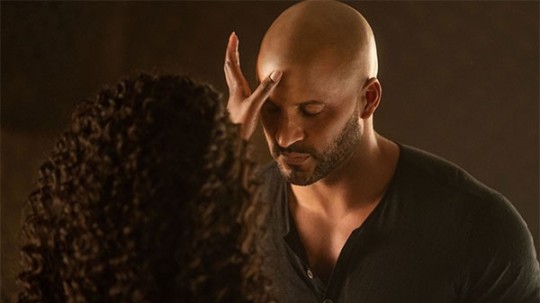
A mostly enjoyable season finale with some very high highs and some very low lows, which sums up season two in a nutshell. Still, any series that gives me this episode and 'Donar the Great' in a single season deserves to go on for many, many years.
Two and a half out of three graveyard snails.
P.S. please bring Chris Obi back next season.
Mikey Heinrich is, among other things, a freelance writer, volunteer firefighter, and roughly 78% water.
#American Gods#Shadow Moon#Mr Wednesday#Laura Moon#Neil Gaiman#American Gods Reviews#Doux Reviews#TV Reviews
4 notes
·
View notes
Note
I finally get a chance to ask my Egyptian mythology question. My 9 yr old daughter and I are reading through a book on Goddesses. In the section on Hathor, it claims that She was also Nut, Sekhmet, and Lady of the Sycamores. Then under Isis, it claims that at some point, Isis and Hathor were combined since they both had sons named Horus. Under Sekhmet it claims she was another face of Isis and Hathor to form a triple Goddess. There are a lot of details between all those things, isn't there?
Egyptian Mythology aka ‘everybody is also everybody else and nobody cares’So it’s important to preface this with two things:Firstly, despite the centralised role of the king (uhhhhhhhhhhhh most of the time) there was never any standardised religion. At all. It never all got sorted out into any sort of neat consistent dogma so gods and goddesses could be/do different things in different parts of the country, get conflated with each other, overlap in myths. All sorts. Nobody cares. Do whatever. As long as the sun comes up in the morning it doesn’t matter.Secondly pharaonic Egypt lasted for about 3000 years. Think how much Christianity has changed since its inception 2000 years ago and that HAS some level of consistency in it anyway.Which is to say that gods/goddesses changing forms, doing different things, being each other sometimes, or getting smooshed together might vary by place but also by time.
So, yes, Hathor was also Sekhmet and got combined with Isis (and sometimes Bastet!) and Hathor-Sekhmet-Isis (or Hathor-Bastet-Isis take your pick) was one of the ‘let’s just smoosh these together sure they all do more or less the same thing’ gods.As to ‘they both had sons called Horus’ it was the same Horus. Hathor means ‘the mansion of Horus’ and as far back as very earliest Dynastic egypt there’s reference to that relationship (that Horus is ‘housed’ within Hathor)Hathor is also mother, daughter, and wife of Ra although not necessarily at the same time and she got associated with Bast partly because they both, loosely, dealt with fertility (same hat! same hat!) and because they were both (and Sekhmet) daughters of Ra. Bastet at one point was the wife of Amun who became conflated with Ra to form Amun-Ra. Really do not try to draw any sort of family tree of Egyptian gods. Just don’t.One of the other reasons for continued associations and sometimes outright composite forms of Hathor with Bastet and Sekhmet is they were all (and sometimes Tefnut? But not Isis) forms of ‘The Eye of Ra’. The title is exactly what it is - Ra’s eye held considerable power and used to wreak vengeance on people who offended the gods but when this power was sent out it was in the form of… well pick a goddess really! So depending on a) which Eye of Ra myth you’re reading and also b) which version the Eye will be a different goddess.My absolute favourite myth is ‘The Destruction of Mankind’ in which a portion of the population decides to rebel against Ra (when he still lives on Earth and rules personally) so he sends out the Eye to deal with it. The Eye goes a bit far with this and won’t stop killing so Ra gets her drunk (no really) so that she stops. There are versions of this exact myth naming the Eye as Hathor, Sekhmet, and Bastet.Hathor was lady of the Sycamore and so was Isis (who in at LEAST one hilarious picture is depicted in the form of a tree suckling the king. Tits out for pharaoh, and all that)

I warned you.Egyptians even had more than one creation myth depending on where in the country you were and also the core ‘important’ deities were different. Heliopolis had the Ennead (probably the most well-known now) but there were different groups of nine across time and space. Again nobody is particularly bothered by this.Gods/goddesses would also fall in and out of favour depending on where the capital city was/where the pharaoh was from. Because different things applied in different places, a shift in locale would mean more importance on whatever the local system at that time was, but people over the country would by and large just carry on with whatever they were doing before.The only time there was an attempt to enforce any sort of standard religious practice nationwide was the Amarna period with Akhenaten introducing monotheism which did not catch on. At all. All of this is a really long winded way of saying1) Egyptian mythology is really confusing if you try to approach it with any expectation of consistency or standardisation. You gotta just let it be, man. Else you’ll go mad (says the person who just wrote almost 50 pages solely on what happened with Bastet over the years and even that was basically a summary)2) I absolutely should not be a teacherNow if you want some actual Egypt-focused books on mythology I can recommend the following:The Egyptian Myths: A Guide to the Ancient Gods and Legends - Garry J. Shaw. Goes through creation myths, the time of the gods themselves ruling over Egypt, mythic environments and impact on daily life, and then the afterlife. Gods and Myths of Ancient Egypt - Robert A. Armour - goes into detail on the Ennead of Heliopolis and also the Triads of Memphis and Thebes and some good renditions of myths. Has a whole section on Hathor, and also a look at the adventures of Osiris and Isis.Egyptian Mythology: A Guide to the Gods, Goddesses, and Traditions of Ancient Egypt - Geraldine Pinch - this one is laid out a little differently and is also longer than the other two. There’s an overview of mythology over time but then it moves on to discussing Mythical Time Lines (chaos, creation, rule by gods, rule by kings, a return to chaos) and a discussion of how the egyptian year worked and the afterlife. Then you get a section of further detail on various deities themes, and concepts which will link you back to other relevant places in the book. Probably the most detailed of the three but also probably slightly above the level of a 9 year old Although I have no idea what the kids are up to these days.
Religion and Ritual in Ancient Egypt - Emily Teeter - less focussed on the myths themselves and more, as the title suggests, how religion worked on a practical level. So talking about communication with the gods, the use of ‘magic’ spells, communicating with the dead, funeral rites all that sort of thing.@thatlittleegyptologist @rudjedet @ikchen i know mythology isn’t really y’alls areas but if you have anything to tack on feel free. DON’T MENTION THE LETTUCE.
465 notes
·
View notes
Note
"I can only wonder how much of you is truly you; what part is just the demon that's seized your soul— or is this all of you?"
THE QUESTION LEAVES HIM BEMUSED, an appropriate reaction given the wicked thing that he is. there was, with good reason, no soul alive who dared to meditate on his existence until he, standing tall is the audaciously bold. bakura readjusts himself, rolling stiff shoulders with a satisfying pop. WHAT PART IS JUST THE DEMON / OR IS THIS ALL OF YOU. was this the extent of human thought, to favour one component over the other because it was easier to comprehend? if so, then he’s grateful to be above their feebleness. neither one nor the other, bakura is a composite, he is complex / winding and twisting like a snake. the paramount design of vengeance and the fears and darkness of mankind; he is consequently god by human understanding, bestowed by birth was something omnipotent, something primordial ——— it was like destiny fulfilled.

❛ what's with the sudden interest? is the pharaoh becoming a little too lackluster for you? ❜ his voice is like thunder in his throat, low and rumbling with mirth. there's a curiosity in him and it blooms into a wretched flower of desire —— he wants to know what kind of hypothesis seto kaiba is capable of conjuring. bakura is more than aware of the man's genius and power, and those qualities alone are deserving of the utmost respect; but still, he finds himself burning with intrigue. ❛ it's no fun if i just tell you, h-hahaha! c'mon, use that brain. ❜
0 notes
Text
Recent listening—
John Zorn, Naked City (1989)
Reserve judgement till after you’ve heard the likes of “A Shot In The Dark” or “You Will Be Shot” (detect a theme?) for in these Lynchian juxtapositions of the mundane and the visceral, Zorn and co-conspirators laugh in all the faces of the jazz purists, art music graduates, avant-garde cultists—compartmentalisers or cataloguers or labellers, basically. The madness was always there. Zorn was only woke enough to listen to the wind and precipitate what she betrayed of her lover’s broken heart, or hearts: New York, L.A., Chicago, either/or, doesn’t matter, once past a critical mass all tend to the same limit, the wind’s seen ‘em all and they’re all the same. Naked City’s a portrait of order gone to anarchy. Whatever identity the “Latin Quarter” once had is here presented as a frenetic collage of whims; predatory, music liable to combust at any given moment. Likewise “Siagon Pickup” for an oriental equivalent. But sometimes the omens are bad enough that you can anticipate the storm, and even enjoy it, revel in it when it comes. Like on “Reanimator” where Zorn’s freakout heralds some insane climax that’s euphoric for the awakened. And please don’t miss that it’s all awfully hilarious to them as they feel and know that these stoic truths are lost on those yet to accept that all’s gone to shit, yes, even in your ivory towers, your vaults and penthouses and corporation headquarters; there its only letting itself take a bit longer to be known, but chaos’ll come, so you might as well wise up and enjoy it.
Death Grips, The Money Store (2012)
Rather a lot to take in upon first hearing. Immediately plainly a refinement of the aesthetic put forth on Exmilitary but now with an entire studio to run around in these kids have wrought havoc on Mr. and Mrs. White’s 8-track ideal—couldn’t come up with a more fitting antithesis to De Stijl (and Mondrian’s, too) if you let the industry wallow another decade. So why’s this defunct Detroit duo in the mind?—cos where are the guitars, man? Every beat’s packed to near bursting with all manner of production craftsmanships (or gimmickries if you see it that way), MC Ride’s tripping bars overlaid—too much matter, really, to be dealt with on the first wave. But you appreciate the covenant this sonic assault bespeaks—this hip-hop New Complexity has room only to deepen from here. So steep in it, and by about round 3 or 4 (depending on how acute your lobes are) you’ll have undergone some sort of desensitisation to this violence in noise—and now you’re in a place to prophesy. Despite Ride’s barely discernible delivery (except on the eponymous hooks to nearly all 13) the ‘point’ of it all somehow gets itself across—it is, unlike the music itself, not very complex, and mainly involves embarrassing amounts of non-specifically directed anger. Dare I say it, there’s no filler on this, it’s a wild enjoyable ride and a happy side-effect to the maximalist production is there’ll always be something to tickle the ear. And when the hooks do come its a righteous clarifying of the chaos that would eventually get old if it stood alone. Plus, theorists can invoke an unholy marriage by ascribing some mutant Bartókian arch form: “Get Got” and “Hacker” as symmetrical sandwiching allegros, “Double Helix” as Nachtmusik?
Ornette Coleman, The Shape of Jazz to Come (1959)
If you’re hearing these albums in the same order I did you’ll get the same shock upon flicking on what you expect to be Coleman’s near-incomprehensible emancipated bebop and instead hearing a tune that’s actually perfectly singable, and moreover, one that you actually know—how’s that? Must be covering some standard which has somehow osmosed itself into your consciousness but—look it up, in fact its a Coleman original! And so where have you heard it before? Ah: Zorn. It seems then that those slurring drunkard articulations on the head to “Lonely Woman” embodied one of the few Coleman melodies (if not the only) that stuck itself to the underbelly of the hard bop canon—shape of jazz to come, indeed. But it wasn’t so much the heads that would (or were, at least, intended to) mould future generations—rather what lay in between: the emancipation of melody, yes, forget keys, forget harmonic structure, and while you’re at it throw your modal jazz out the window. I’ve always felt ‘harmolodics’ to be a poor term because really it ought to be just melody, that element of music which Coleman raised to the highest pedestal; melody alone, melody a priori. But as a pseudo-theoretic buzzword it does just fine.
John Coltrane, Offering: Live at Temple University (1966)
First thing you notice is Coltrane’s uncomfortably, blatantly in the fore. There’s a need to turn it up so you can make out the other activity and by the time you’ve done so Trane’s tenor’ll be blaring out so loud it’s like he’s right by you. But the mixing seems to get more favourable as the numbers progress—or maybe you just adjust. Yes, revisiting, he’s up in your grill but not to intimidate. He’s there to send a very personal message. This was, after all, his penultimate live recording before he quit the grid in July of ‘67. He was getting close to something, and to tell it, he’s gotta get close to you. In the old quartet he might’ve had trouble getting so spiritual. You get the feeling that the mystic tendencies were more at home in this more familial second ensemble. There’s a communion of sorts. And technically they’re equally fine: Alice takes up right where McCoy Tyner left off and actually on her solos she’s more in line with her husband’s ‘sheets’ than her predecessor, part of the reason why the closer on this has replaced what used to be my favourite “My Favorite Things”: Belgium ‘65, check it here. And this is no mean feat as Tyner’s comping/the extended solo on that one’s where quartal harmony came of age, or at least in my experience. The opening to the Offering take’s also a real rarity: double bass goes at taut catgut like anything but cool. We’ve heard with what’s now alarming regularity the rhythm section’s other two rip loose free-form and its high time the other essential’s had a stake in the fun. But now let’s discuss what assures Live at Temple a place in legend. Drop in somewhere about halfway through “Leo”. Trane’s just finished up screaming outta his tenor. Rashied Ali’s going at it now, wild thing on the kit like a hurricane, whirling, whirling, an Almighty gnashing of teeth on calf hide for six or so minutes when all a sudden Trane comes—or is it Pharaoh?—some fella a-moanin’ like a lunatic at the rapture; Obeah Man, elder. Some sole black voice monophonic, like plainchant only infinitely more ancient. What, or whom, are they invoking? Seems they’re their own demons—that, or they’re oracles, come to preach the word in sonic semiotic, purveyors of the sound and the fury.
Food For Animals, Belly (2008)
These D.C. fellas put out a remarkably consistent aesthetic and with more personality than you might expect from hip-hop in the industrial vein. That is, what you might expect is: An incoherent, arbitrary mish-mash of overvolted sawtooths, saturated found noise, and other cheap effects; at heart no more than a glorified dubstep. That’s where Christgau was coming from with Death Grips as “Skrillex-as-Unabomber or Skrillex-sans-fun”. But this, like Hill’s trio, is undeserving of such scoffing critique. Any incoherence (and sure, there’s plenty) is but part of a higher level narrative that itself is coherent. Hear it like timbre composition—argument between textures drives the musical conflict. Timbre variation dictates form. And sure, the jargon’s a little dry so let’s talk application: lyrically “Belly Kids” retells the ubiquitous suburbian nostalgia that we also found on the Arcade Fire’s Grammy laureate. As words cast mind’s eye far back, music evokes some sort of youth decay in reverse; the same motion but in sonic terms. The opening’s the hardest the beats ever get on this. Only one direction to go from there. So we ease up and ease up, harshness tempering at each fresh verse, vector very clear, then arrival at the final lines, delivered nude, final lines and the final element: the word. And you know them because they’re self-same to those that were spoken in the apocalyptic beginning. Brahms would be proud. A similar clarification but more on the scale of the Tristan resolution occurs between “Maryland Slang” and “Tween Fantasy” in which the former’s verse is resurrected (Mahler would be proud) before the latter’s velvet shimmering manifold, a thousand tiny chimes in a gentle breeze. And there are many more gems to be found in this urban gizzard (hints: “Shhhy” sample, preprise/main event) but I’ve written enough already.
1 note
·
View note
Text
Yugioh S1 Ep 12: Bakura Single Handedly Just Murdered Everyone
Up until this point Yugioh has been pretty predictable. Really, up to this point nothing has changed the formula. It’s the monster of the week, and usually through the power of friendship or Yugi’s psychic powers they can get through every duel.
But, this is the point where everything starts going off the rails, and it’s after this point where we’ll see the good weird stuff that probably should not have aired on a little kids TV show and the good weird stuff I wanted to review. Now, I promise that it’s all going to go down but first, the show has to pretend this will be like any other episode, so they have a good natured duel.

Also, I’ve had a major flu this month so hopefully I don’t misspell too much. Screen capping Netflix is basically all I can currently do with my brain, and so my commentary will probably be more minimal this episode.
(more under the cut)

Joey wins, but only because Rex is the only dueler on the entire island more dumb than Joey. By winning, Joey also won that rare Red Eyes dragon, which I’m sure will be important at some point, but whatever.



The fighting between Tristan and Joey brought out Yugi’s rarely seen third form, which is very hard to look at:






This screencap right above me right here: that’s basically Yugioh in a nutshell.
Anyway, Mei shows up and proves that she has a heart, although she likes to tease them. She admits, that she’s probably going up against Yugi in the finals so it is against her best interests to feed them. I guess word gets around if you get possessed by an ancient card King like five times a day?


And then we get a good spread of Anime Food! Even when it’s not drawn to be particularly tasty, there’s just something so great about people inventing little food packagings for low budget TV:

We got the guy with the curry dinner plate and the very small arm, the fish with either a single eye or one mouth in that cute little can

and I’ll have whatever these guys are having!

Mei takes over the role as camp Mom, which the boys complain about but whatever she brought them a meal. Like a whole on meal. Tristan and Joey especially, seem like the worst kids to babysit.


Tea really hated Mei like 5 episodes ago, but all Tea really needed was a shower to decide Mei was all right. I also like the touch that Mei would insist watching the shower door because she figured the other boys would be creep-o’s, although I’m pretty sure the boys were too busy trying to toast candy bars.


There’s a rustle in the bushes, and here’s the slightly complicated thing--there’s two people rustling through these very same bushes. One is Bakura, who I mentioned in the header, the other is this very large heavy set man below:

There’s a lot of Middle Composition shots in this episode. Funny how Middle Shots are either Horror because it’s unsettling (as seen here) or Wes Anderson. And there is no in between.
Somehow Bakura and this very large man never bump into each other, which is very lucky for the heavy set man. And, since Mei and the kids had a fight, the kids decide not to check up on her. If they had checked up on her--then what happened afterward probably would not have happened, isn’t that Karmic?




Enter, Bakura, our super villain in a crewneck and teal button up that we have all completely forgotten about at this point. Who is afraid of a teal button up? I really want to know why our character designer was like “you know what’s terrifying? JCrew knits!”
Also, Bakura has an accent--and it’s pretty British. I suspect this is because he and Yugi have almost the same sounding voice--they might even be the same voice actor for all I know.

And although he strutted through the bushes like an actual ghost, they decided, hey, lets all talk about cards around a campfire, while also completely loosing track of how long Mei’s been lost in the woods.


My audible gasp when I realized the Legging Boots have a reason to be there.

And, just like that, they decided to duel with the devil. First, they found this giant tree stump, left over from some Redwood, and then made the fire a loooot larger, and then got themselves all ready for a completely normal duel.
Now I’d like to point that there has been no indication that Bakura is evil. None. He hasn’t said anything weird. He hasn’t done anything menacing. All we’ve seen him do is walk around the woods, walk around the deck of a boat, and walk around in a bush. If it wasn’t for the music--there’d be no way to predict what happens next.




And I like that Yugi can recognize this thing, but does not recognize the thing lodged into Pegasus’ left eyesocket. They all have the same logo for crying out loud.

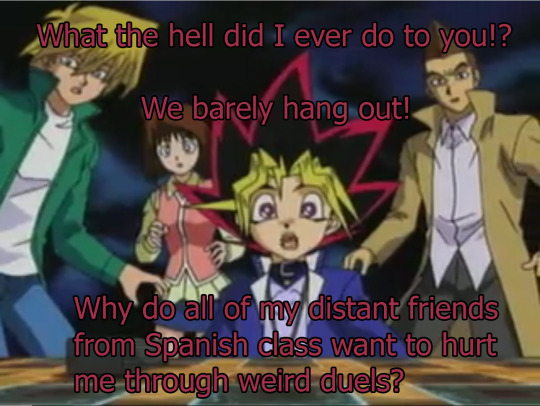
And the craziest thing about this whole exchange is that Bakura doesn’t bother to explain or say anything at all because he just doesn’t need a good reason. He just freakin straight up kills all of them. Right there. All of our characters that thought he was their friend are now dead.

Now, my internet gave up about this point so we don’t get the good early 00′s CGI shots of their souls getting shoved into little cards in Yugi’s deck, so just bear in mind, that happened. I guess hypothetically you could say that they’re still alive since their soul is encased in a card, but I like call it dead if your soul leaves your body--that’s just me. That’s just how I’ll define it because I feel like I need to make some sort of limit to what dead and alive are.
Our death count on this children’s show is now at 5 by the way, if you don’t count Pharaoh or the weird pink haired orc half of Kaiba’s soul.
But, it’s about time that someone else shows up that can rival Pharaoh, other than Pegasus who’s just been sitting at that table and eating cheese, still, at this very moment. And while Yugi is a good boy and all, honestly, What good has Yugi done with his powers up until now? Really nothing: he’s not even aware that he has them.
So the fact that other people--people who can actually use this necklace--have been looking for this necklace for like thousands of years and will murder him for it, was bound to catch up with him. I’m kinda surprised Pharaoh didn’t leave him a post-it memo “FYI maybe don’t walk around with that necklace right out in public.”
Anyway, RIP.


rare shot of Yugi’s hair seen from the top.


He had to lure Yugi into dueling him, since that’s the only way ownership of the puzzle switches person to person, (like what happens if you’re just dueling Yugi for fun and you win? Do you get automatically cursed with Pharaoh brain? That sucks) But since Yugi is two people, and Bakura only got rid of the one, the duel isn’t quite over yet.

And then this classic shot that I do recognize because about 1/3 blogs during middle school/high school had this as it’s banner. Not my blog though, mine was some cats and nutella.

So we’ll see soon, I guess, how Pharaoh plans to put their souls back into their bodies to resurrect them, I guess this is just a thing he can do. He’s gotta duel first though, I guess he’s got a contract or something. Gotta respect the contract.
Also did Mei get abducted by a completely normal person, then? What the hell, Yugioh!
Next Week, on Yugioh: If Pharaoh looses does he double die? Where was Bakura planning to store all these bodies? Everyone is a card now? Does anyone eat those cute cans of fish?
#yugioh recap#yugioh#anime#recap#review#photo recap#this one got weird#really fast#I honestly don't have too much to say at this point#haha#s1 ep12
29 notes
·
View notes
Text
Why I returned to Islam via /r/islam
Why I returned to Islam
Hello, sorry this is so long.I was an Ex-Muslim for 3 years when I was 13-16 years old. I wanted to share the reason I converted and see if any of you have anything to contribute or add/subtract.
I had known little about Muhammad (sws) prior to becoming an atheist. Upon leaving Islam, I learned from Ex-Muslims he was basically the worst person to ever exist. Obviously this wasn’t true and those people just have some bias. I noticed this bias quickly due to their horrible arguments in disproving Islam e.g. that the Qur’an says the Sun sets in murky water. I thought this argument was so terrible when I was only 15 years old and an Ex-Muslim, that I figured I should try to learn from Islam on my own and more objectively because if that’s their best argument Islam may be pretty sound.
I initially reasoned that Muhammad (sws) must either have been a liar and conman with ulterior motives, hallucinating and delusional, or was a prophet of God just as I would reason Joseph Smith or anyone else would fall into one of these 3 categories.
Liar and Conman:
This was my first inclination. However, I quickly ran into some oddities. For one, the Qur’an itself rebuked Muhammad (sws) in a few areas including Chapter 80 where Muhammad (sws) is rebuked by the Qur’an itself. This alone doesn’t really prove he wasn’t a liar or conman, it just is a bit peculiar and gave me some pause. Eventually, an evaluation of a number of hadiths did rule out the prophet being a liar for me. I found it too unlikely the prophet was lying or trying to seek ulterior motives for the following reasons:
He was physically abused by his contemporaries including being nearly choked to death I cannot imagine with his life threatened consistently that he would continue risking his life for 12 years in Mecca.
He repeatedly refused king-like treatment (e.g. the straw-mat hadith) a liar or conman would presumably accept kingly treatment and superior treatment.
The prophet starved himself)... Often(another example) a conman or liar would presumably please himself with food not torment himself with starvation.
The opportunity presented itself for the prophet to lie and say a solar eclipse was due to the recent death of his son, but he refused to and told his followers that the Sun and Moon are just signs of God, they do not eclipse for the birth or death of anyone a liar would have taken advantage of the situation, again presumably.
Muhammad (sws) performed the ritual fasting and prayers far exceeding the requirements of the religion, which also does not make sense for a conman or liar either.
In short, for at least these reasons outlined above, I found it unlikely the prophet was a liar or conman. It helped that the Quryash even considered him truthful but was not necessary to make this point. It would not make sense for a man to lie about a religion with no exterior motives i.e. no increase in wealth or gluttony. His refusal to encourage superstition surrounding him and his refusal to end his message despite suffering verbal and physical abuse that almost cost him his life on multiple occasions really made this first possibility that he was lying or seeking an ulterior motive highly unlikely. Maybe he was just hallucinating?
Hallucinating or Delusions:
Delusions and hallucinations are different. A delusion is a false belief and a hallucination is perceiving something that is not truly there. E.g. a delusion would be you believing the Sun is trying to kill you, a hallucination would be you see the Sun inside your bedroom with a knife. The two can unfold together but aren’t required. My concern with the prophet hallucinating was 4-fold.
Many verses in the Qur’an were revealed cogently in response to queries by Muhammad (sws)’s contemporaries. But the most damning example would be Surat Yusuf which is an apparent replica of the story of Joseph in Judaism that was a supposedly a test of his prophet hood. This could not be the product of a hallucination due to its perfect similarity. This chapter even makes the correct judgement of calling the king of Egypt a king and not a pharaoh (12:50) while the bible fails to make that distinction (Genesis 41:17) and incorrectly refers to the king as a pharaoh.
The coherence of the Qur’an in it’s prose-yet-poetic like composition does not align itself with hallucinations.
The rhythm and meter of the Qur’an is too well-developed to be the product of a hallucination. Chapters like Ar-Rahman, Ya seen, Tawkir, Qiyamma, Tawba are beautiful. For the record, the entire Qur’an is beautiful in composition which eliminates the explanation that the Qur’an was produced as a hallucination. A hallucinated-dream which spawned the Qur’an would not rhythmic or linguistically beautiful as the Qur’an is nor as coherent or responsive as the Qur’an is.
Masterpieces like Ayat an-Nur and more apparently Ayat Al-Kursi. The symmetrical nature of ayat al-kursi as can be seen here a hallucination would lack such symmetry.
In short, my problems appear to be that the Qur’an is too beautiful, coherent, and correctly responsive to critics (e.g. Surat Yusuf, and Kahaf) to be the product of hallucination.
Now that’s hallucinations. But what if the prophet was not hallucinating and was delusional? He would have produced the Qur’an himself but would be delusional in believing his production was from God. But this would require Muhammad (sws) not being aware of his production of the Qur’an, hallucinating during the production of the Qur’an, or having lied and saying he didn’t produce the Qur’an but that it was a message from God despite being fully aware he produced the Qur’an from his own hands.
The first two fail as the Qur’an produced without consideration nor thought would not be coherent nor rhythmic, nor would a Qur’an from hallucination. For the third option we already discussed why I reject the prophet being a liar.
Due to this deductive reasoning, I came to the conclusion that Muhammad (sws) must have been inspired by God and became a Muslim again at 16. I am now 26 lol.
Submitted August 23, 2020 at 11:21AM by Dr_Sattar_iz_Bae
via reddit https://ift.tt/34qGd5R
0 notes
Text
Exodus 12 - translation, music in verses 1-20
Passover פסח and pass through עבר are unconnected in sound and share no letters. That they are connected in English is very misleading to the sense of the words. We might more accurately name the feast as Skip. The plague skips houses. I have avoidֶד using pass over for עבר. This word עבר has more presence to it than Passover which if anything has absence in it. It would be impossible to avoid Passover as a gloss and still be speaking to my contemporaries. Trouble meets us everywhere. If we attribute such to God, then the trouble is not skipping us as if to pass us by, but all the waves are passing through us.
The ultimate trouble is death. We wrestle with it daily. Our response may tend to be grasping as if we had any control over it. Our mechanism breaks. Our time is done. The pitcher at the fountain and will no longer hold water. This plague will get Pharaoh's attention. We are the absolute monarch of our own selves, or so we think. But death gets our attention too.
Hebrew word order makes sense to me much of the time. There are three very common reasons for adjusting the word order from the Hebrew to the English. (Remember, besides my concordance rules, I am trying to align the significant words with the Hebrew music of the accents.)
verb-subject must more often than not become subject verb.
negative construction must be put in readable sequence, (the negative phrase in Hebrew typically begins with a negative particle.)
adjectives and other modifiers following a noun may need to precede it.
Example in verse 19: - make this into a sentence.
Seven days yeast not will be found in your houses if anyone eats what is leavened then will be cut off being that from the assembly of Israel whether guest or native of the land.
Verse 19 is a repetition of part of verse 15. Repetition is a clue to look at what is contained by it. Verses 16-18 are the instructions for the feast and its rationale, a memorial. I note that it refers to your ancestors, a generation that in that context does not yet exist since the text is addressing the ancestors themselves. Clearly this text is a composite of story + address.
In verse 15, translations are clarifying the meaning (?) by adjusting the word order of whole phrases. (Are these dangling modifiers or parenthetical insertions?) It seems to my reading that the cutting off of the individual or group (נפשׁ) that is eating leaven is a temporary suspension - during the feast.
Note also that that slippery word that I never render as soul is rendered as man in the KJV in v 16 but as soul in v 15. And of course since we don't understand either word, we read condemnation and punishment into verse 15, but simply instruction into verse 16. If we read that way, we will miss the point of human communication, let alone divine communication.
If you look at the music for verse 20 you will see it imitates the first phrase of Genesis. Now you know why the exodus via Torah is the beginning of time and creation.
from Blogger http://ift.tt/2wykIjg
via IFTTT
0 notes
Photo





(via The 'Completion Backwards' Principle of Restoration: Part I, 'The Altar of Separation'. The Division of the book "Divine Principle", Rev. Moon's brilliant, but flawed, Masterpiece)
============================================
Myung-hee Kim with whom Moon had an illegitimate child (Hee-jin Moon born in Japan in 1955) while Moon was still married to his first wife, Sun-kil Choi. Choi could not endure Moon’s many sexual relationships and divorced Moon on January 8, 1957. In a 1993 interview Sun-kil Choi said: “My husband made relationships one after another by deceiving those women. I kept thinking that I couldn’t bear such a life any longer – so this was the reason for my divorce.”
The Korean Lover of Women:
the “Ravenous Bird from the East”
================================
The Story of Rev. Moon, uncovered in the Old and New Testaments
================================
Isaiah 46:11
“…..Calling a ravenous bird from the east, the man that executeth my will from a far country:
yea, I have spoken it, I will also bring it to pass; I have purposed it, I will also do it…..”
Luke 12:47“….And that servant, which knew his lord’s will, and prepared not himself,neither did according to His will, shall be beaten with many stripes….”
The Man who Thought, and Taught, that he was “God”
Rev. Moon said he was “God Incarnate“, the historic fulfillment of all scripture; as being the actual revealing in the flesh of the Living God, but his death on September 3rd in 2012 seems to have proven quite otherwise, happening a few scant months before Barack Hussein Obama was anointed the King of the Third Israel, which I accomplished with my servant John on the “Official Day of Celebration of Dr. Kings Birthday“, at my Father’s command, on January 21st 2013: in Washington DC.
That Rev. Moon died so close to Barack’s Reelection Victory at the National Level, shows he was in the position of King Saul in his untimely death, just as it proved that “Barack the Blessed” was now firmly established in the position of our David. But the real story of why Rev. Moon made so many costly errors has to do with who he chose to do business with in America: the Rich and Powerful, and most especially: the Right-wing Fundamentalist Christian Republican Pastors and DC Politicians.
And a more corrupt, narrow-minded, and hypocritical bunch of judgmental bigots could scarcely be imagined. But this was Rev. Moon’s pattern; from the South American Nazi remnants he used in Argentina, to cozying up to the Yakuza Japanese Mafia, and then even including deals with the Ultra Right Wing-Nationalist Japanese, many of whom were notorious War Criminals; he bade them all enter his good graces.
A Walk in the Park??
The anointing of Barack Hussein Obama, which I did with the help of my servant John in Washington DC on January 21st, 2013, at my Father’s behest, casts some doubt on Rev. Moon’s previous claims of divinity, and his assertion prior to his death on October 3rd, 2012, to being the eternal and final Incarnation of Christ, Lord of the Second Advent, whose death left many in the Unification Church shaken in their belief of his Divinity: especially when he suddenly died like any mortal.
Calling oneself the Christ is to include one’s standing with my Father Jesus as having the divine status of being a “Son of the Living God“, which term Peter used to describe my Father. Few doubted Rev. Moon’s claims to divinity in his Church, but few outside of his followers paid any attention to his endless boasts and countless astronomical number of titles.
In contradistinction to claiming his status as Messiah, it was Barack who was given the crown of the Messiah at the National Level on the Global Stage, for having won both of his elections, as of the manifest Will of the People, twice, thus restoring the position of the “son of Joseph“, once called “Ephraim“, in Egypt ( ..which name means “..doubly fruitful..”), and in his second reelection was the one responsible for the “Restoration of Ephraim” entirely, which was now restored as meaning the entire Northern Kingdom of Israel, being in the position of our “David“, even as Dr. King was our “Moses“.
And this was done by remaining faithful to the providential history of the incredible suffering of the Black Christian Race over the last 430 years, from 1500 ( when Columbus returned with an Armada ), until 1929; for Dr. King, and now Barack himself, who rules America as the Global Abel, and orders the True Caliphate of Islam as it’s Mahdi, because he converted from Islam to Christianity, removing the Veil to see Michelle our first Black First Lady, standing then as Sheba, as the queen of the South herself, on that very Foundation of Substance which Rev. Moon pretended did not exist.
But Davetta Holder, Director at the Unification Theological Seminary in New York, knew quite well what I was speaking of, when I explained to her about the Black Christian Race as being the “Manchild” of Revelation 12, in bonding with the White Youth of My Generation to produce the REAL Third Israel in America; but she chose not to speak out to the Korean rulers of the Unification Church about me, and because she knew Barack Hussein Obama represented the “David” of the Internal Restoration of Canaan, as Dr. King did as our “Moses“, and for which saying, or even believing, no doubt, as the reason she lost her job.
Others like Magnus at HSA-UWC, and Tossa Cromwell, and now Dr. Panzer of the UTS, for whom Davetta Morgan was his Director at UTS before she was fired, are all suspected of having a real grasp of the fact the Manchild of Revelation ( chapter 12 ), as the Black Christian Race, with which My Generation of committed, idealistic, and passionate white youth totally bonded, and are all now being fired or offered humiliating demotions and cuts in pay, for secretly even knowing who truly are the REAL Third Israel. The Black Christian Race and My generation who STOOD at Beth-El in the 3 day Separation from Satan at the Global Level, which began the Internal Exodus to the Kingdom of Heaven as the Promised Land at “Woodstock” although this was at the town of “Beth-El” as “The House of God.” The Unification Church denies this to this day….
There are many who know I speak the truth about this, yet will not speak out; just as the Jews did long ago with not publically stating their true beliefs and confessing my Father Jesus 2,000 years ago, in their fear of being thrust out from the Synagogues by the Pharisees, which still happened when Rome closed in….and everyone realized the End of Israel had come; just as my Father Jesus said would happen.
The same situation is in play now with me and my scared converts, who are still inside the crumbling edifice of monetary corruption and justified patterns of composite lies; afraid to speak out, as the Pharisees who believed in my Father stood in almost exactly the same situation 2,000 years ago.
The Unification Church well knows who I am, but they in the Church who know of me, dare not confess me, for fear of Widow Moon having them tossed out in the street, thereby losing their jobs and positions, as the Koreans hold the purse-strings, and Widow Moon’s Clan holding all the assets and the property.
Yet the Providence of Salvation is quite clear to those unbiased minds and pure hearts, unclouded by fear or doubt: in taking the responsibility to end slavery it was then Lincoln’s move which set up the Formation Stage for the Restoration of the United Kingdom of North and South Israel, Ephraim and Judah, seen at the conclusion of the Civil War ( the Condition of Indemnity for the North being the bloodiest conflict ever seen in human history, and dividing even families for the Union on the North and Dixie for the South, many facing each other in battles in many places ), with the Growth Stage seen at the Civil Rights Movement ( the Condition of Indemnitybeing that of the lives lost by the lynching’s and killings by the police and the Klan, and the attacks on the Marchers and beatings of the Protesters, and violence against My Generation of the White Youth in Solidarity with the Black Manchild ), and for all the patriots who fought for the Dignity of the entire Human Race seen in the struggle of the Black Christian race in the position of the Hebrews in Racist Egypt ( when the first-born were being drowned in the Nile by Pharaoh’s racist decree ), and then the Perfection Stage seen at the Civil Victory of Equality: completed as in the Restoration of Ephraim with the 430 years of Time-Indemnity ( from the year 1500, as of Columbus’ return to America with the Armada after 1492; to 1929 when Dr. King was born, which happened as the “Crash” occurred, as the Condition of Indemnity at the National level on White America, for the Oppression of the Black Christian Race, both economically and societally ), this being the price paid for the Lost Ten Tribes being restored, or “found”, as the Prodigal Son “returning” to the House of God the Father seen at Beth-El “The House ( of David ) of God”, collectively: victorious at the National Level, as “My Generation” itself.
This was the real significance of the Internal Restoration as of “taking Egypt from within“, seen when our Nation rose at Beth-El, Woodstock, in our 3 Day Separation from Satan the Devil, in leaving Racist Egypt forever, as a New Israel. The one living at Beth-El, Bob Dylan, was our Joshua ( even as Woody Guthrie was our Caleb ), who had led us in to the Internal Canaan, and the 31 bands at Woodstock represented the 31 kings Joshua defeated when he entered the Promised Land.
Barack Obama was thus a King whose crown represented the Victory of Internal Restoration, as when Christianity took Rome from within by that 430 years, as the date when Augustine died in 430 AD, conquering it from within, as the Third Israel did also.
I represented the Prodigal Son at the Individual level in my resurrection from the dead. And who is the Prodigal Son? It the Son of David: Solomon himself; the Fallen One. That it is plainly he with the number seen at I Kings 10:14, for the gold given in one year: 666 talents of gold, for Midas, as that was the mythic gloss for the figure Solomon himself.
In fact the twist that his daughter became gold at his touch is really how with his wealth that he “lost his soul”; as the story of his daughter being turned to gold was the clue as to how a man could trust in his riches but then “lose his eternal soul”, and the kingdom forfeited as well, signified by the 10 tribes Israel “lost” due to the fall of Solomon, not in his Wisdom, but in his Folly.
Thus it is the lust for “Fortune and Fame” that are the “Number and Name” of the Beast. Solomon had both, as some can recall.
The Victory of the Return of Ephraim
This victory meant that the North, coming forth as the Deliverer in the position of God, was the one paying the Indemnity for the Foundation of Faith, as the “Enactor in Substitution“, seen first with Harriet Tubman, who went through the Individual level in her Course of Restoration when she escaped from Slavery, broadened to the Familial level when she went back and got her Family, risking her life, and then enlarged again when she went back and got all her Relatives in her Extended Family as of the Tribal level, and then went back again and again; saving all others she could thus enlarged her mission at the Racial Level, and then watched, as her mission went to the National level, with the Northern States as the Deliverer, and Lincoln as our Moses, and Abolitionist John Brown as our Aaron or Warrior High Priest.
John Brown was a fiery orator and chief instigator of the Abolitionists, and had taken a Vow in Church to bring Freedom to the Slaves, which Lincoln finally did with the Emancipation Proclamation. Thus we reached the National Level when the South’s last Commander of the Confederate Army General Joseph E. Johnston surrendered on 4-18-1865 ( “….Memorandum, or Basis of Agreement, made this 18th day of April A.D. 1865, near Durham Station, in the State of North Carolina, by and between General Joseph E. Johnston, commanding the Confederate Army, and Major General William T. Sherman, commanding the Army of the United States in North Carolina…” ) with President Abraham Lincoln paying the National Condition of Indemnity with his own life a few days earlier, on April 14th: Good Friday.
================================================
0 notes
Text
52nd Fleur du Cap Theatre Awards Nominees Announced
Fleur du Cap Theatre Awards
The Fleur du Cap Theatre Awards is considered amongst the most coveted within the South African performing arts community. The awards began in 1965 and annually award the best productions from the many stages in and around Cape Town. The awards are judged by a panel comprising local critics, journalists, writers and drama educators.
The Fleur du Cap Theatre Awards recognise members of the performing arts community for acting, directing, staging and technical abilities as well as theatrical development and excellence. The annual awards ceremony and red carpet event takes place in March each year. This year’s event promises to be “Alive with Flair” and takes place at the Artscape Theatre in Cape Town on Sunday 19 March 2017.
Awarded in 20 categories, over 85 productions were reviewed and considered for the 52nd edition of these awards. For a number of reasons awards will not be awarded for Most Promising Student and Best Puppetry.
The nominees for the 52nd Annual Fleur du Cap Theatre Awards announced today are:
BEST PERFORMANCE BY A LEAD ACTOR IN A PLAY
Andrew Buckland for The Inconvenience of Wings as Paul
Desmond Dube for I See You as Buthelezi
Marius Weyers for The Father as André
Nhlanhla Mkhwanazi for Cattle Drive as Ra
Ralph Lawson for A Voice I Cannot Silence as Alan Paton
BEST PERFORMANCE BY A LEAD ACTRESS IN A PLAY
Anna-Mart van der Merwe for The Painted Rocks at Revolver Creek as Elmarie Kleynhans
Ilse Klink for Kristalvlakte as Priscilla
Jennifer Steyn for The Inconvenience of Wings as Sara
Jennifer Steyn for A Doll’s House as Nora Helmer
Susan Danford for Clybourne Park as Bev/Kathy
BEST PERFORMANCE BY A SUPPORTING ACTOR IN A PLAY
David Viviers for The Finkelsteins are Coming to Dinner as James
Dean John Smith for Kristalvlakte as Ephraim
Lunga Radebe for I See You as Shabangu
Motheo Madisa for Cattle Drive as Enoch
Rob van Vuuren for A Doll’s House as Nils Krogstad
BEST PERFORMANCE BY A SUPPORTING ACTRESS IN A PLAY
Amy-Louise Wilson for The Father as Laura
Anthea Thompson for A Doll’s House as Mrs Kristine Linde
Babalwa Zimbini for Ityala Lamawele as Yiliwe
Bianca Flanders for Kristalvlakte as Miela
Megan Furniss for The Finkelsteins are Coming to Dinner as The Mother
BEST PERFORMANCE IN A REVUE, CABARET OR ONE-PERSON SHOW
Antoinette Kellerman for As Die Broek Pas as Ella Gericke
Daniel Richards for Pay Back The Curry as Various
Marlo Minnaar for Santa Gamka as Luck Marais
Pieter-Dirk Uys for The Echo of a Noise as The Narrator
Wessel Pretorius for Die Ontelbare 48 as Various
BEST PERFORMANCE BY A LEAD ACTOR IN A MUSICAL OR MUSIC THEATRE SHOW
Anton Luitingh for Annie as Daddy Warbucks
Earl Gregory for Joseph and the Amazing Technicolor Dreamcoat as Joseph
Jonathan Roxmouth for I’m Playing Your Song: The Marvin Hamlisch Story as Marvin Hamlisch
Jonathan Roxmouth for Sweeney Todd as Sweeney Todd
Paul du Toit for Hedwig and the Angry Inch as Hedwig
BEST PERFORMANCE BY A LEAD ACTRESS IN A MUSICAL OR MUSIC THEATRE SHOW
Bianca le Grange for Joseph and the Amazing Technicolor Dreamcoat as The Narrator
Charon Williams-Ros for Sweeney Todd as Mrs Lovett
Charon Williams-Ros for Annie as Miss Hannigan
Genna Galloway for Hedwig and the Angry Inch as Yitzhak
Lilla Fleischmann for Annie as Annie
BEST PERFORMANCE BY A SUPPORTING ACTOR IN A MUSICAL OR MUSIC THEATRE SHOW
Dean Roberts for Joseph and the Amazing Technicolor Dreamcoat as Jacob/Potiphar
Germandt Geldenhuys for Sweeney Todd as Adolfo Pirelli
Jonathan Roxmouth for Joseph and the Amazing Technicolor Dreamcoat as Pharaoh
Michael Richard for Sweeney Todd as Judge Turpin
Richard Vorster for Annie as Drake
BEST PERFORMANCE BY A SUPPORTING ACTRESS IN A MUSICAL OR MUSIC THEATRE SHOW
Candice van Litsenborgh for Sweeney Todd as Various
Delray Halgryn for Annie as Lily
Sanli Jooste for Sweeney Todd as Johanna
Taryn Sudding for Annie as Grace
Zoleka Mpotsha for A Man of Good Hope as Asad (as a boy) / Musharaf
BEST DIRECTOR
Christiaan Olwagen for A Doll’s House
Jaco Bouwer for Santa Gamka
Lara Foot for Karoo Moose
Lara Foot for The Inconvenience of Wings
Noma Dumezweni for I See You
BEST LIGHTING DESIGN
Ben Cracknell for Annie
Faheem Bardien for Ityala Lamawele
Jaco Bouwer for Santa Gamka
Tina le Roux for Sweeney Todd
Wolf Britz for A Doll’s House
BEST SET DESIGN
Colin Richmond for Annie
Greg King for Sweeney Todd
Rocco Pool for The Father
Rocco Pool for A Doll’s House
Saul Radomsky for Clybourne Park
BEST COSTUME DESIGN
Birrie le Roux for District Six Kanala
Birrie le Roux for Clybourne Park
Colin Richmond for Annie
Neil Stuart Harris for Sweeney Todd
Niall Griffin for Joseph and the Amazing Technicolor Dreamcoat
BEST SOUNDSCAPE, ORIGINAL MUSIC COMPOSITION OR ORIGINAL SCORE
David Kramer for District Six Kanala – Original Music Composition and Original Score
Charl-Johan Lingenfelder for The Painted Rocks at Revolver Creek – Soundscape
Nhlanhla Mkhwanazi & Motheo Madisa for Cattle Drive – Soundscape
Ulric Namasun Roberts for Santa Gamka – Soundscape
Wilken Calitz for Kristalvlakte – Soundscape and Original Score
BEST NEW SOUTH AFRICAN SCRIPT
Amy Jephta for Kristalvlakte
Lara Foot for The Inconvenience of Wings
Mongiwekhaya for I See You
Penelope Youngleson for Sillage
Ralph Lawson & Greg Homann for A Voice I Cannot Silence
BEST NEW DIRECTOR
Mbongeni Mtshali
Quanita Adams
Wessel Pretorius
52nd Fleur du Cap Theatre Awards Nominees Announced was originally published on Artsvark
0 notes